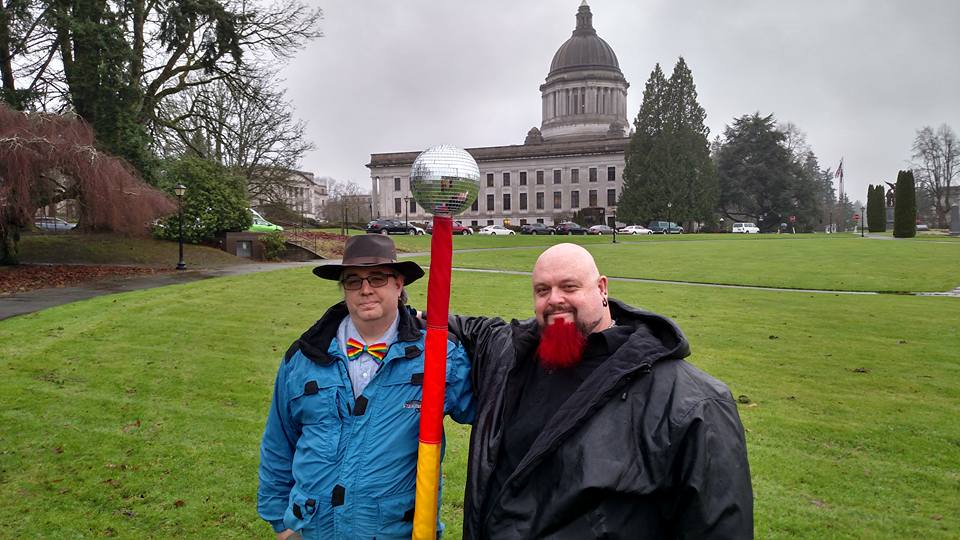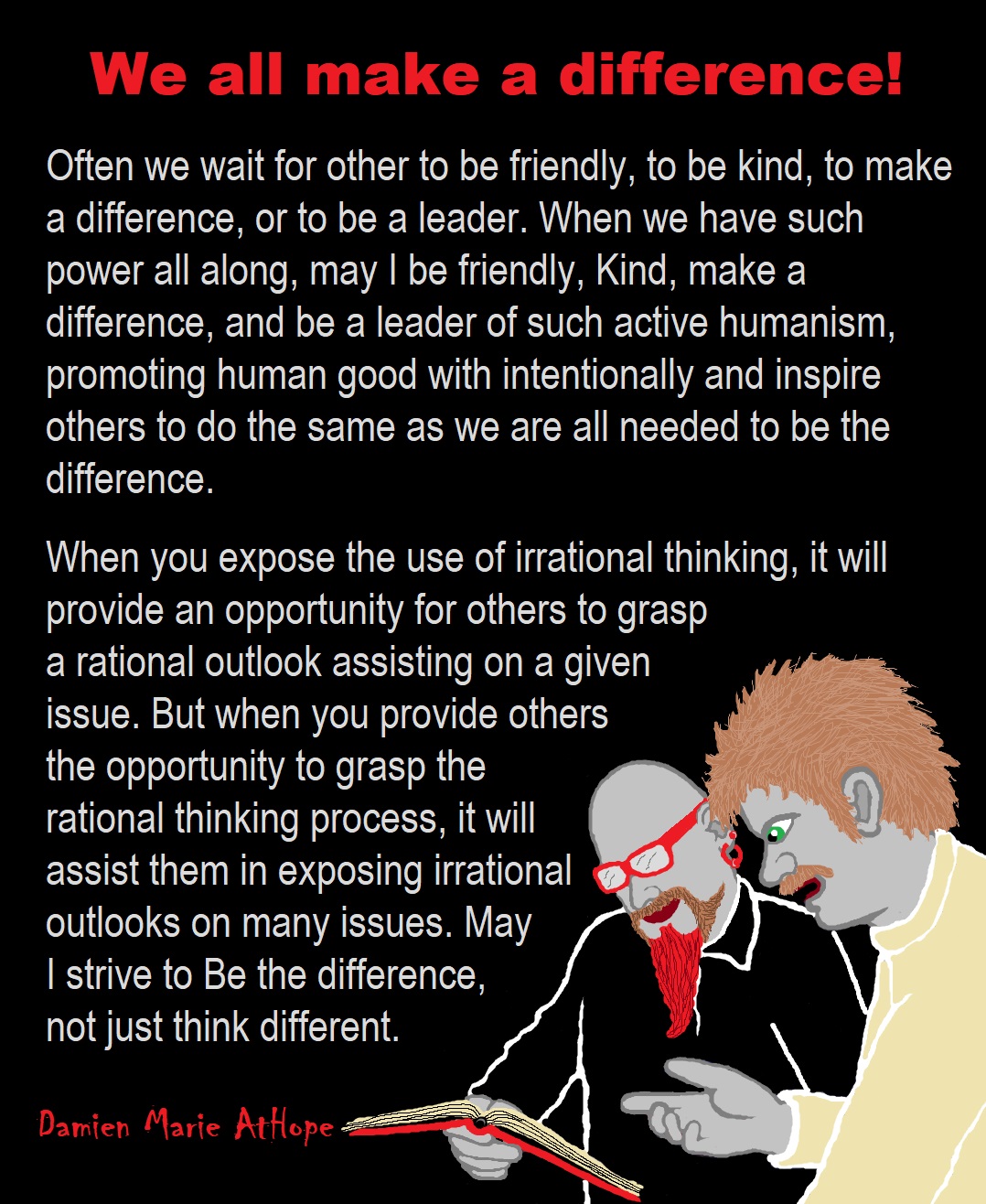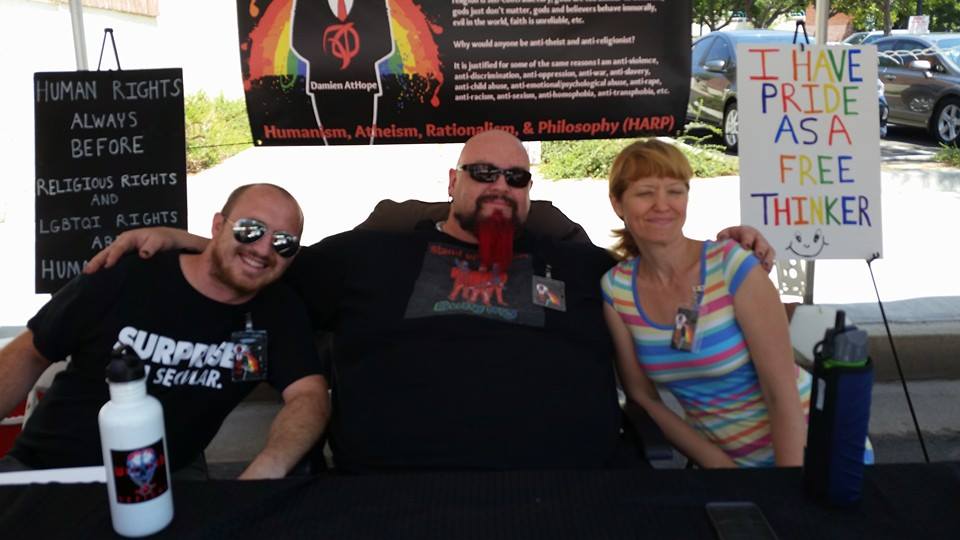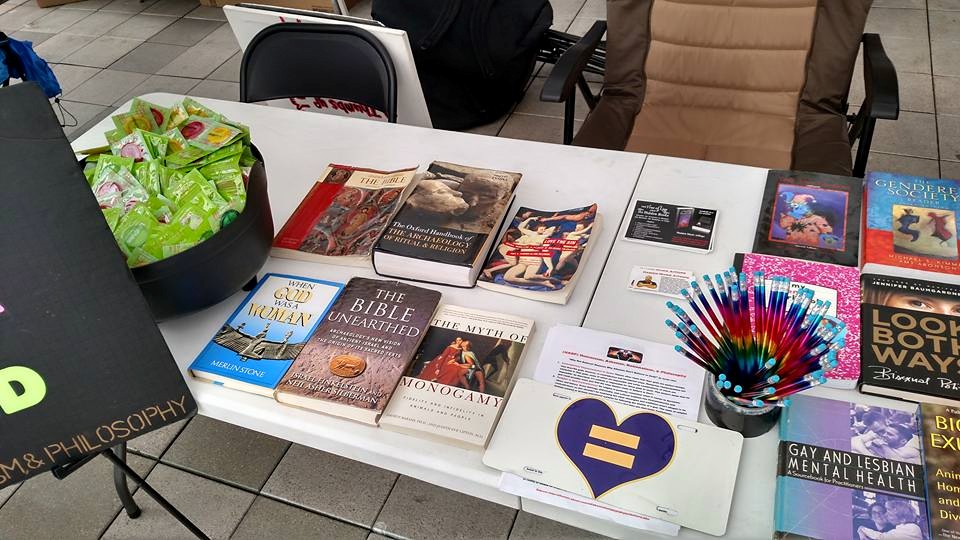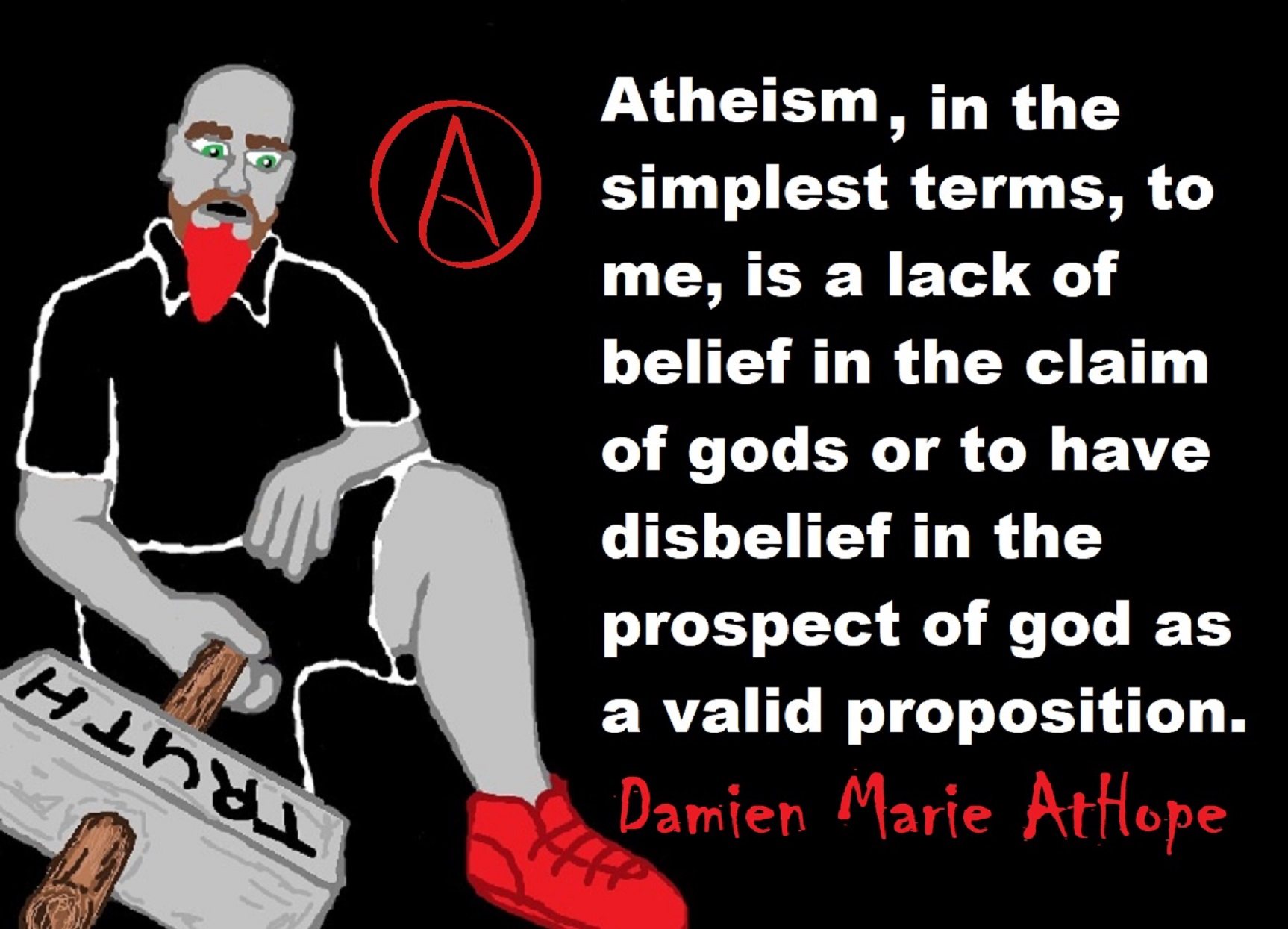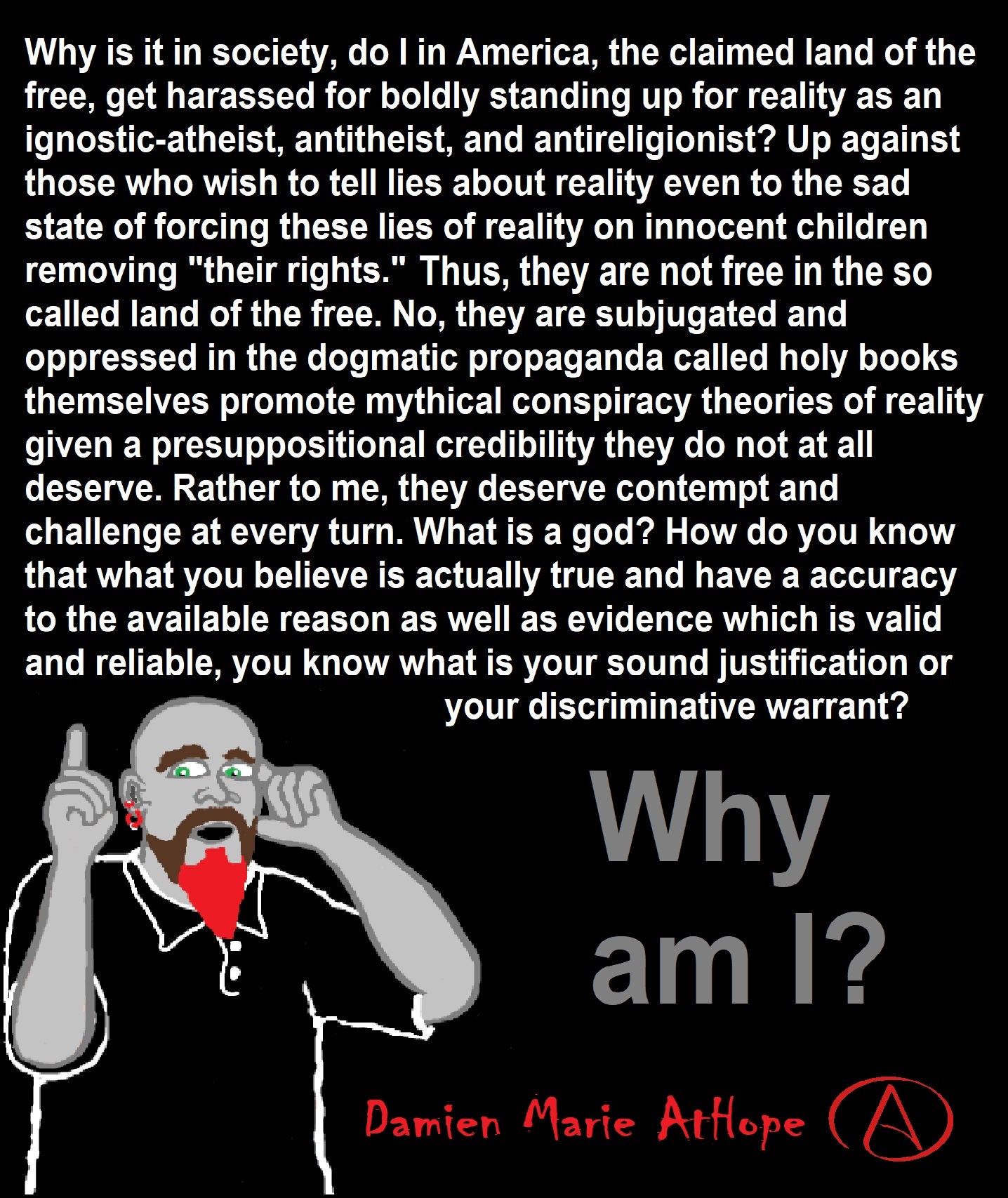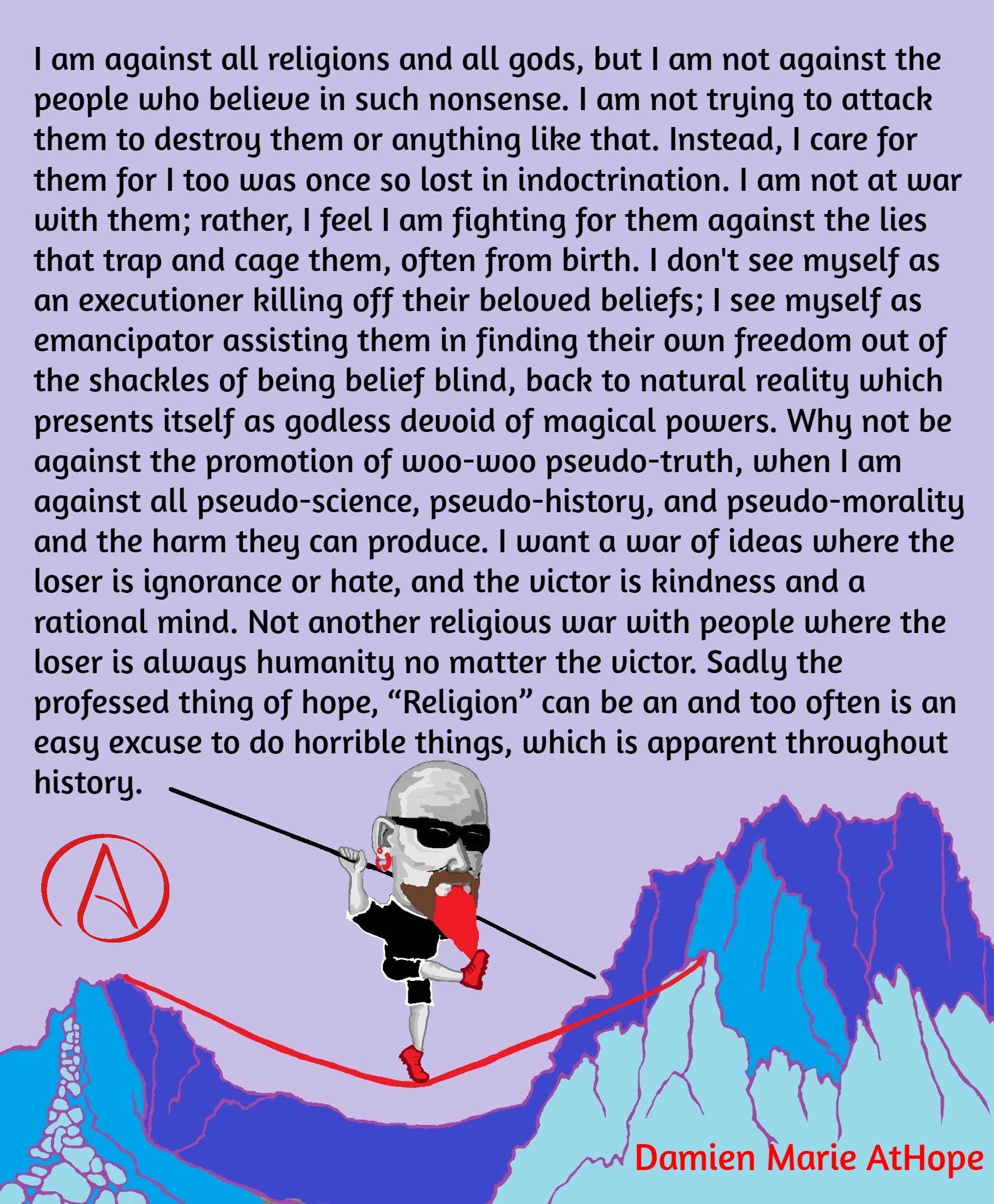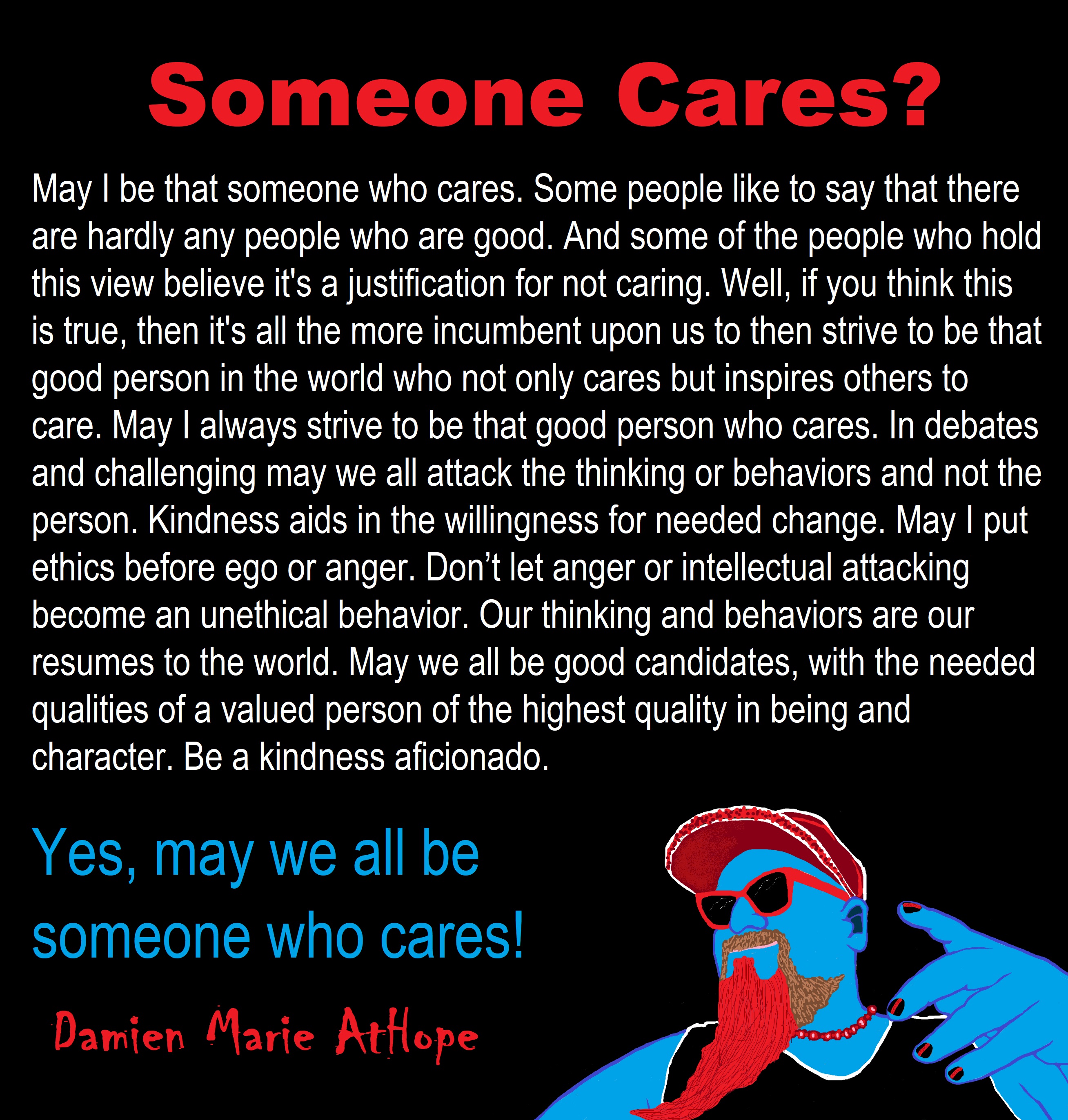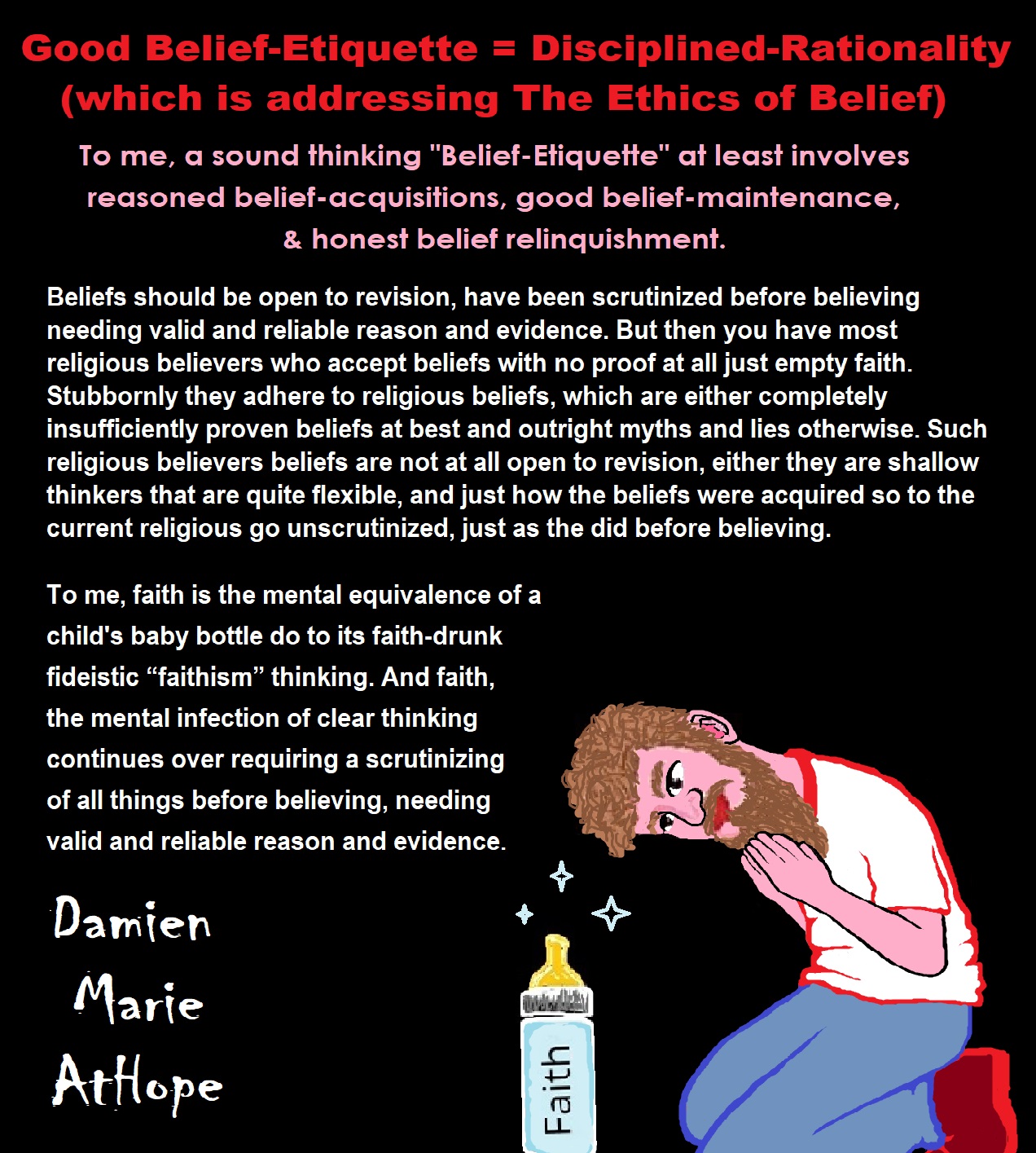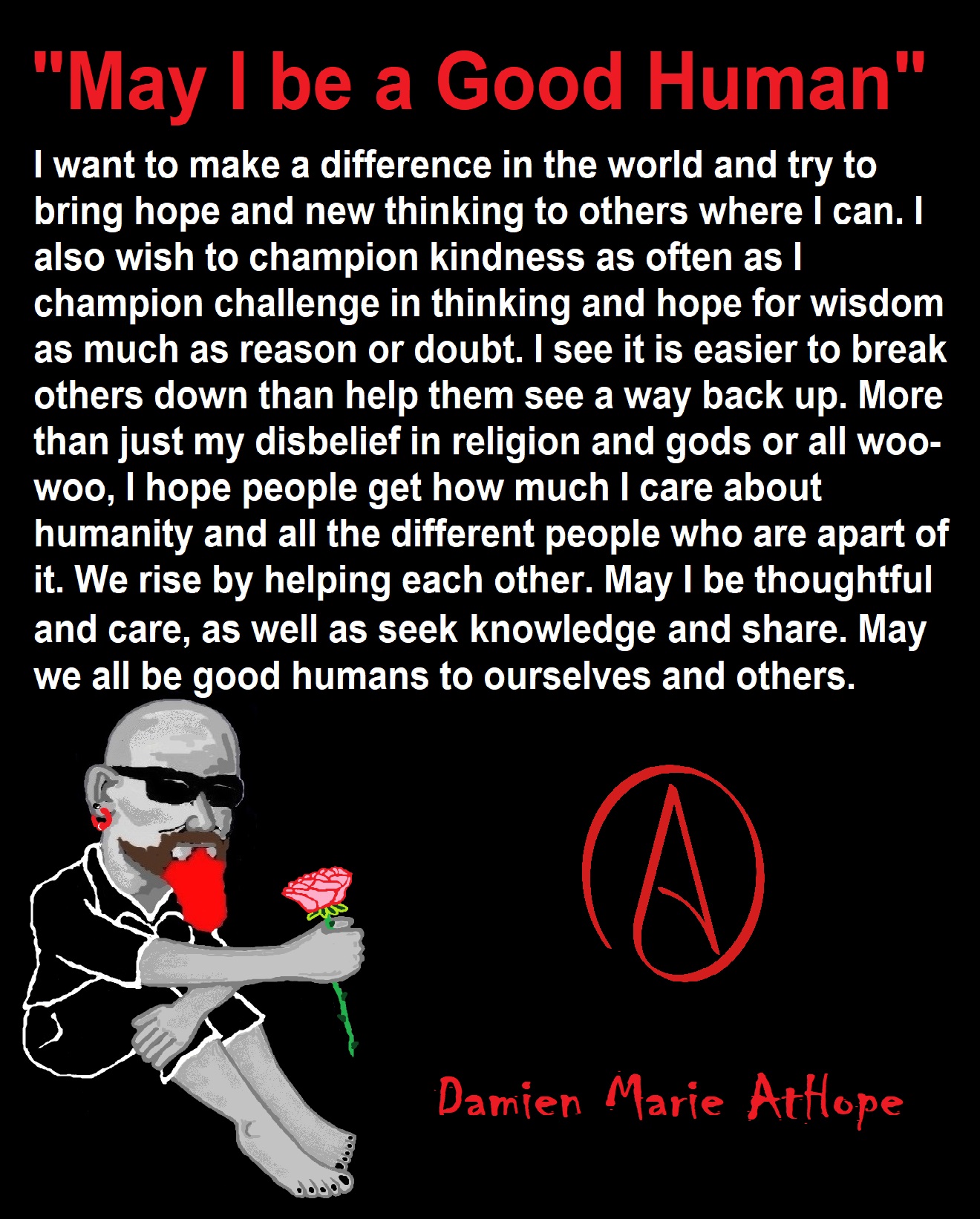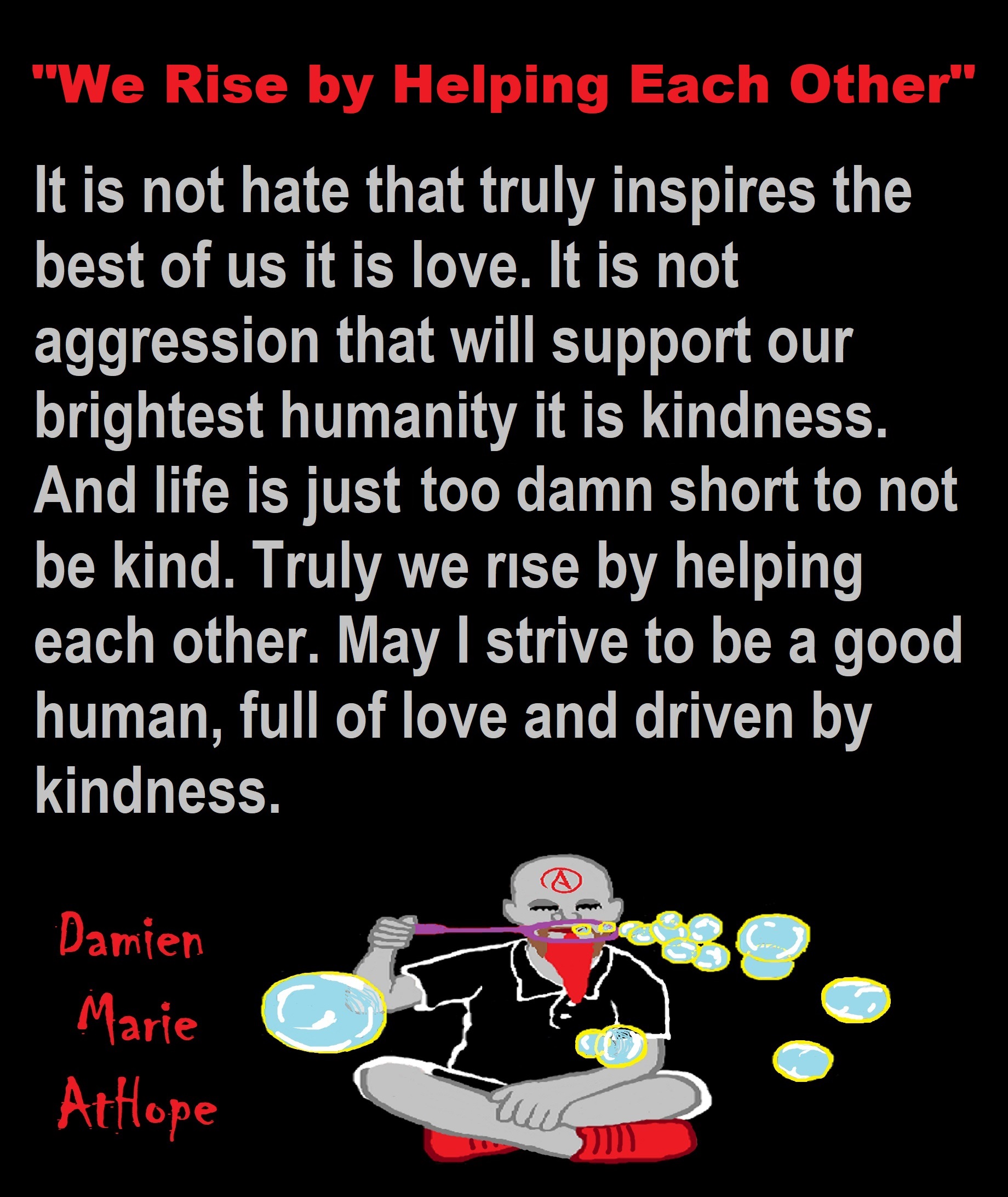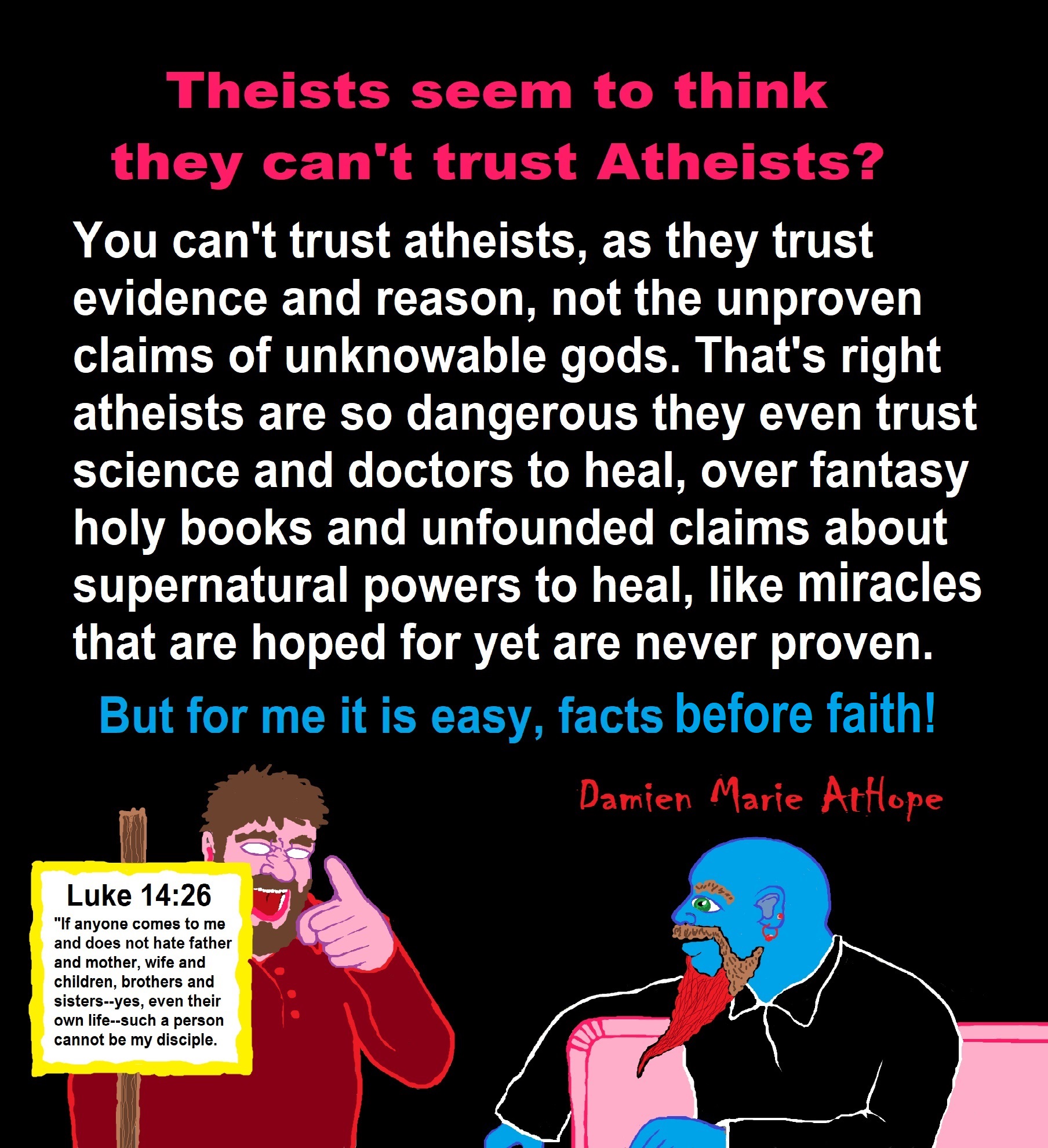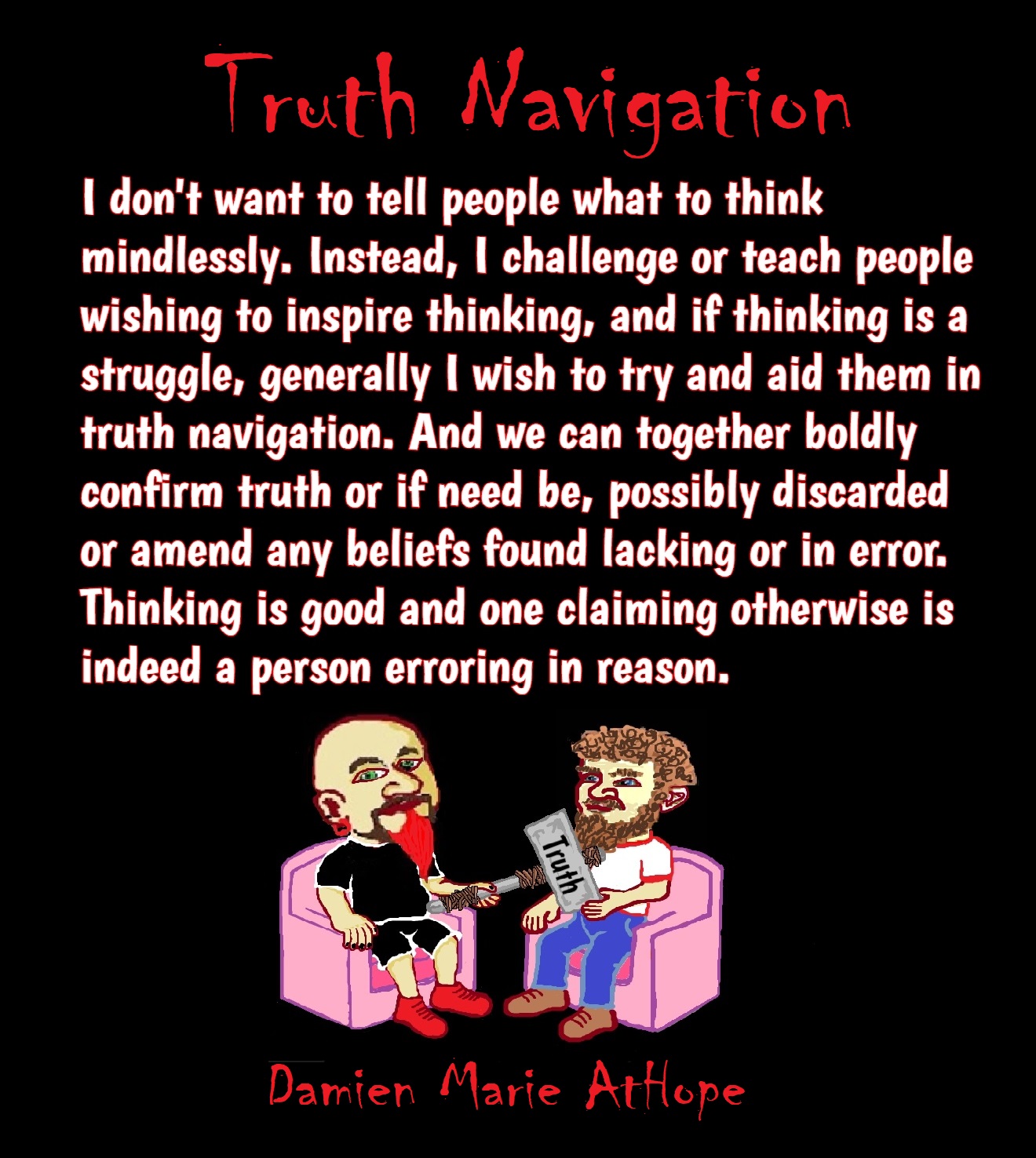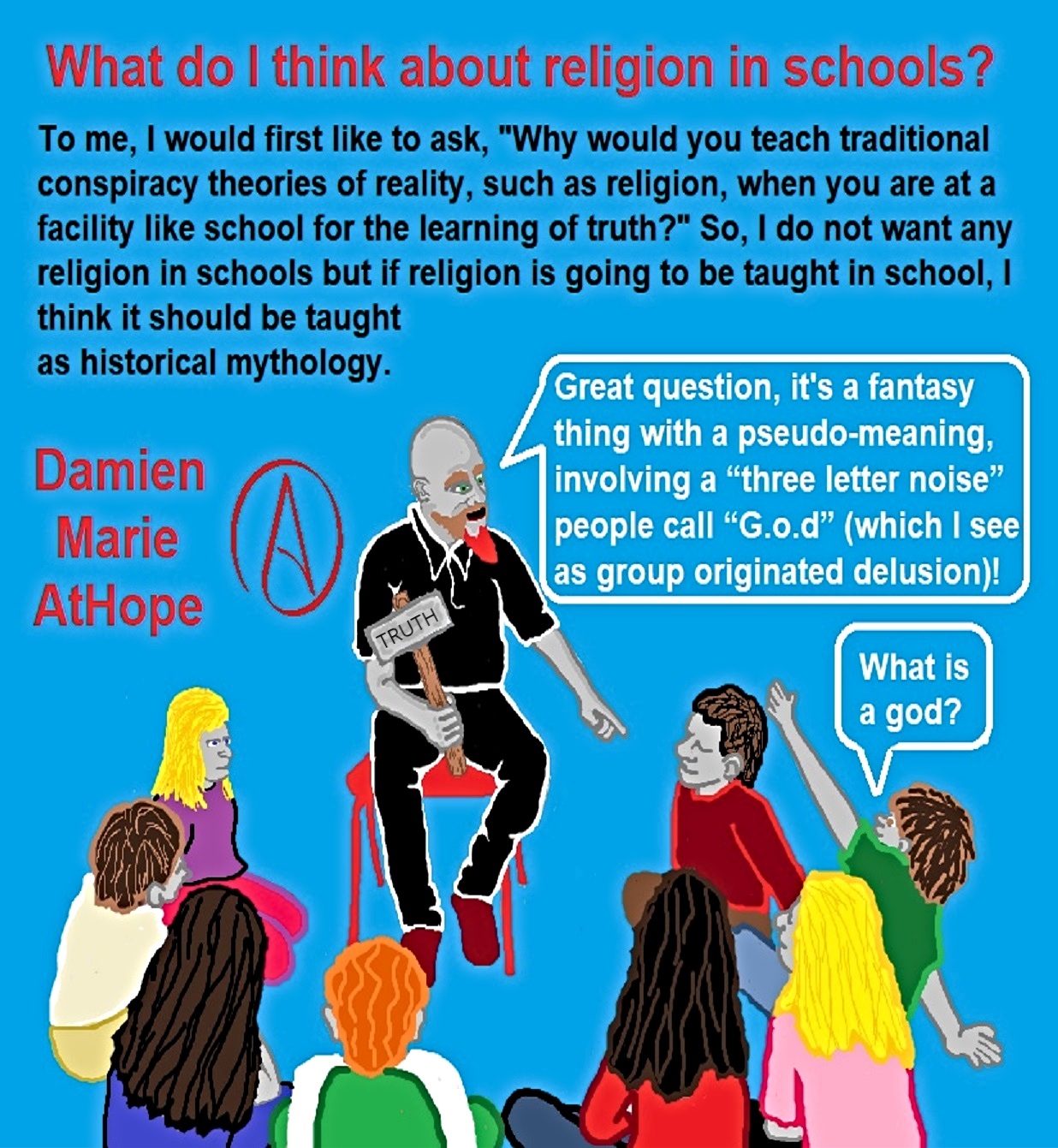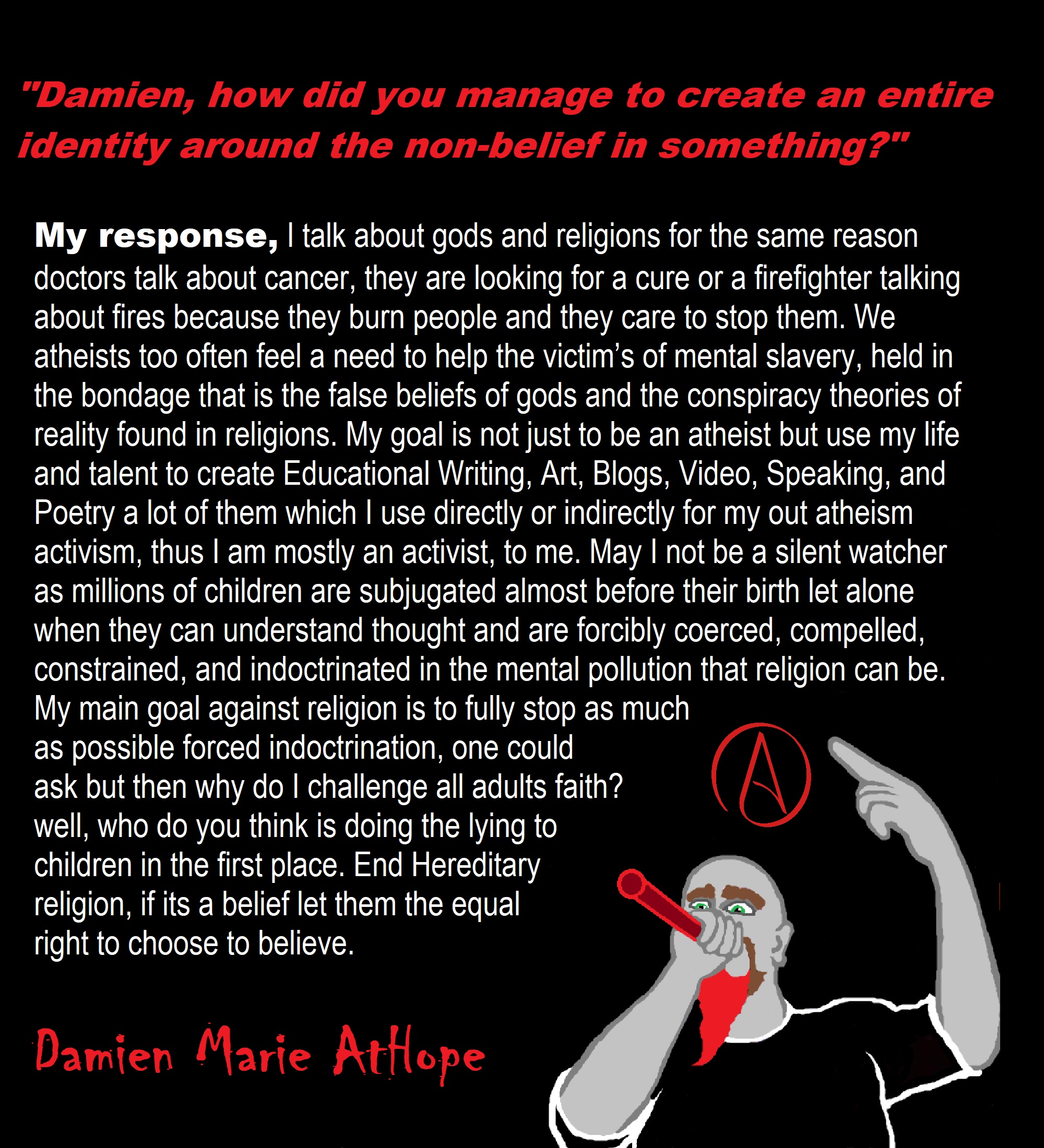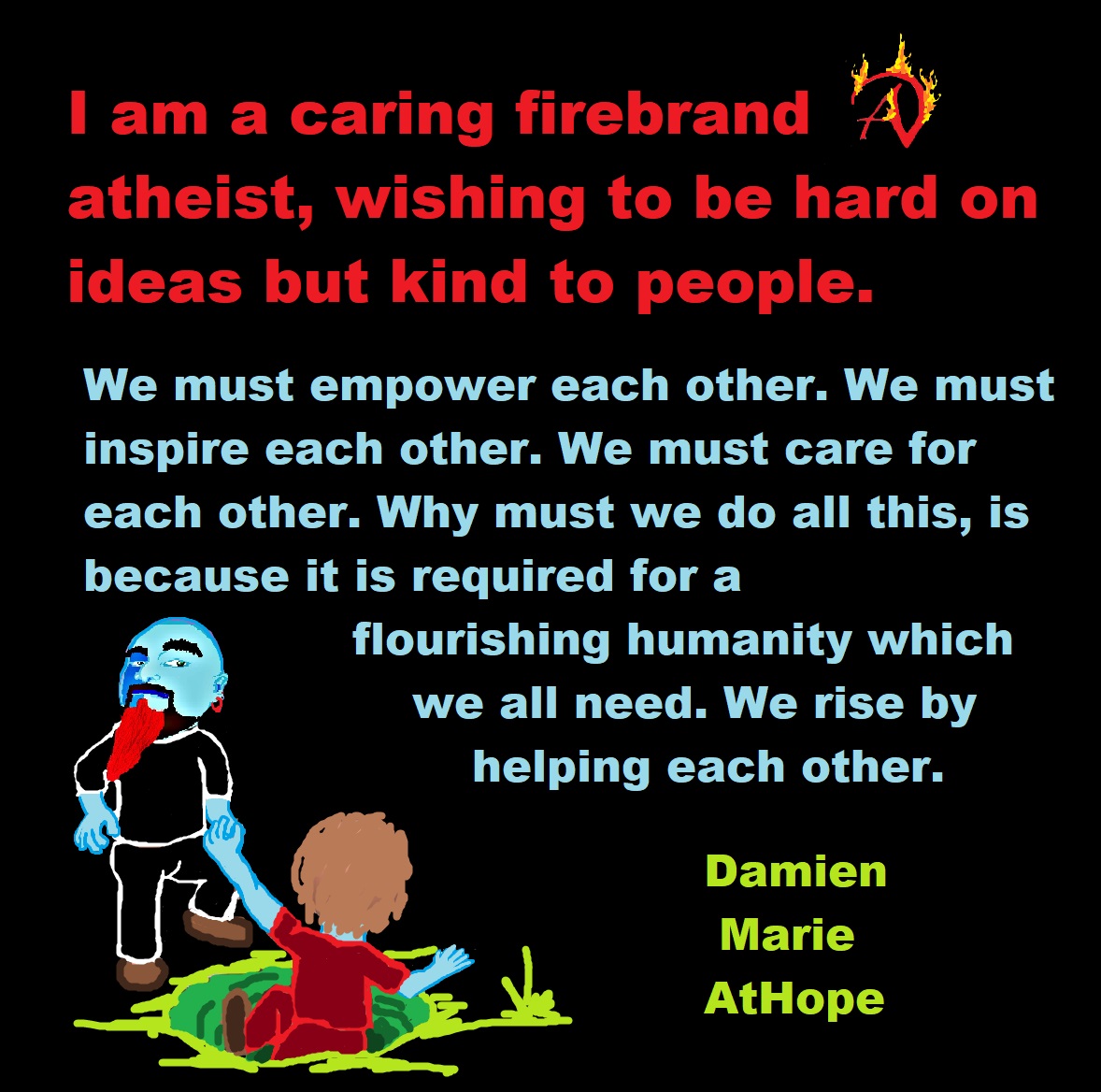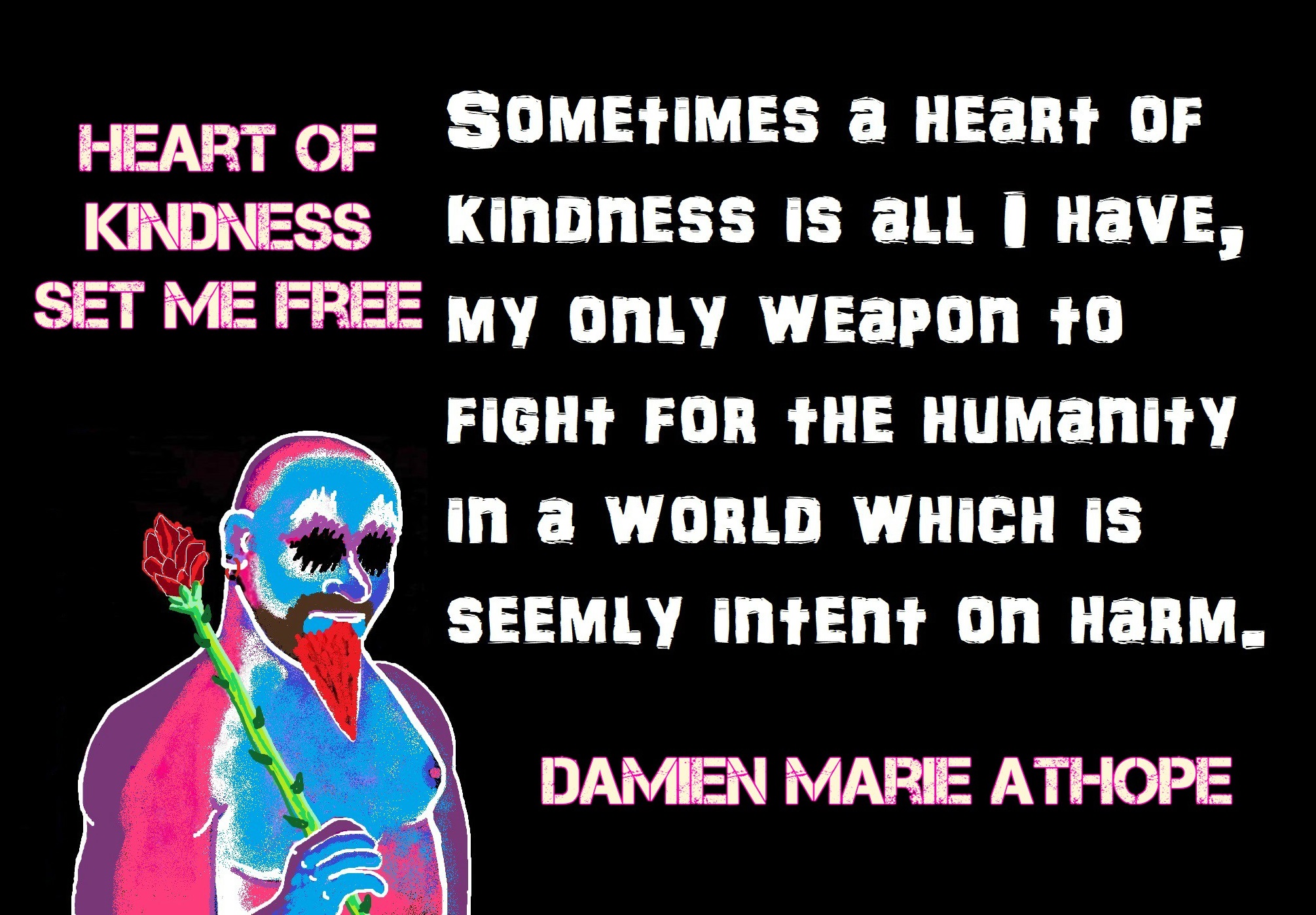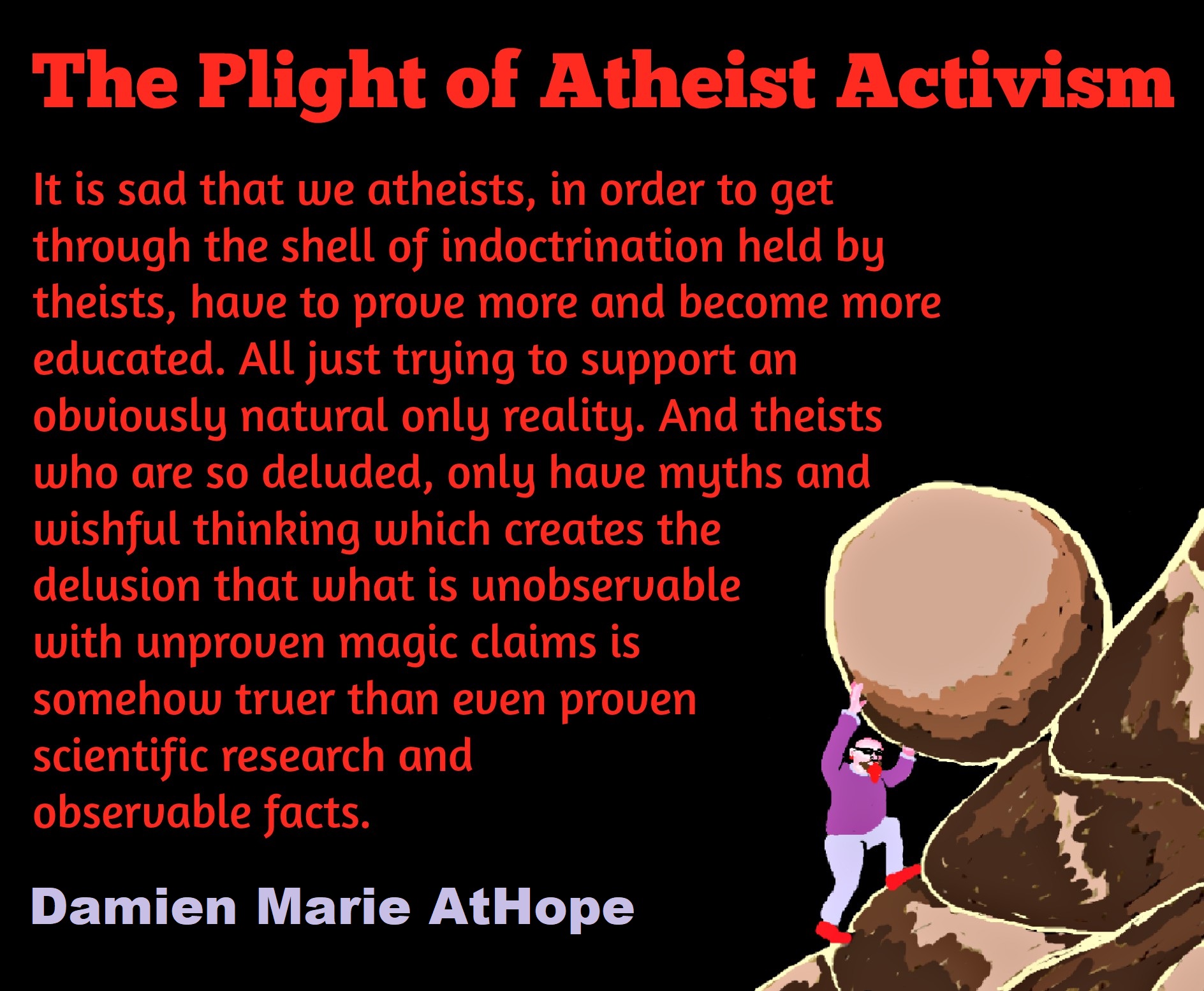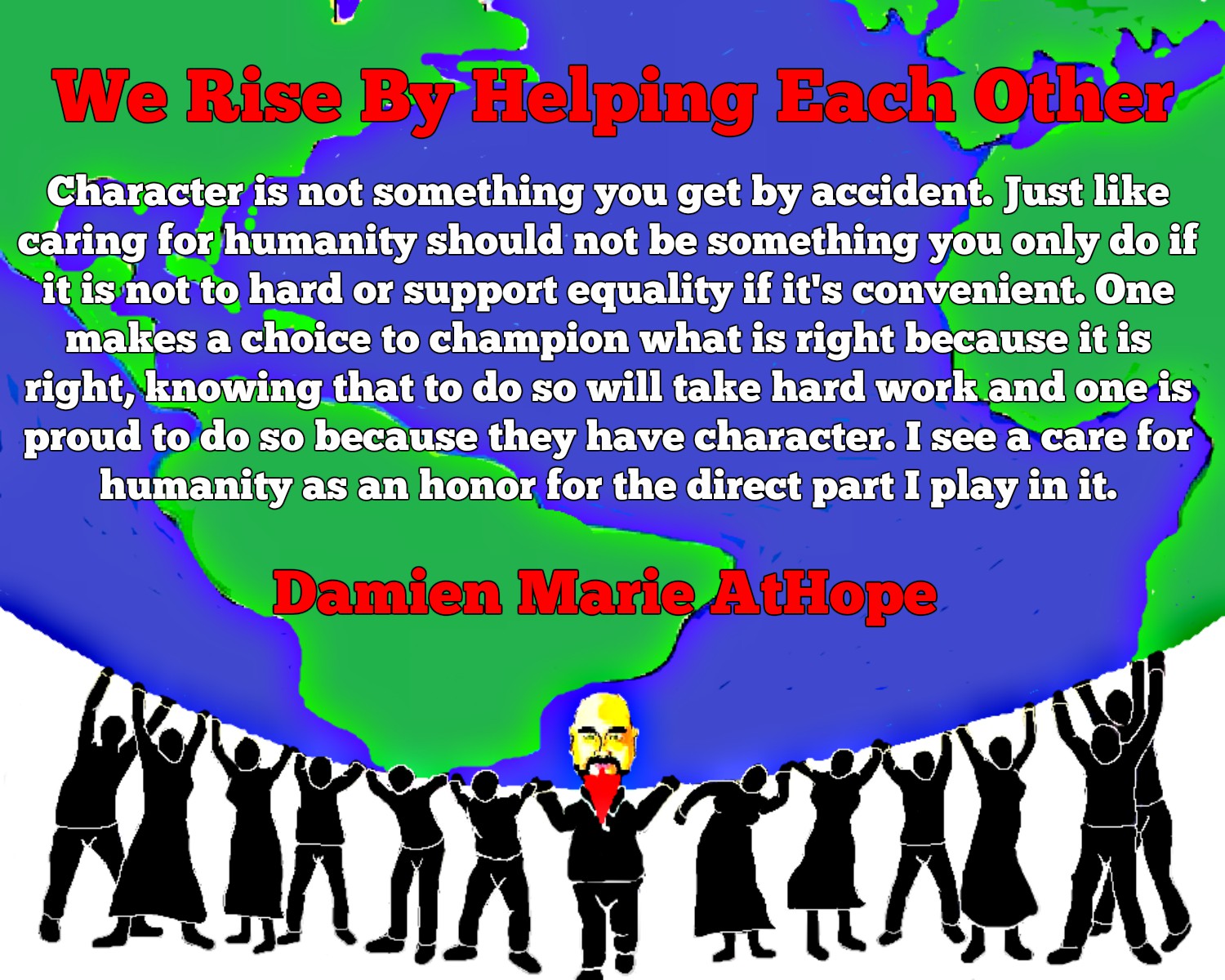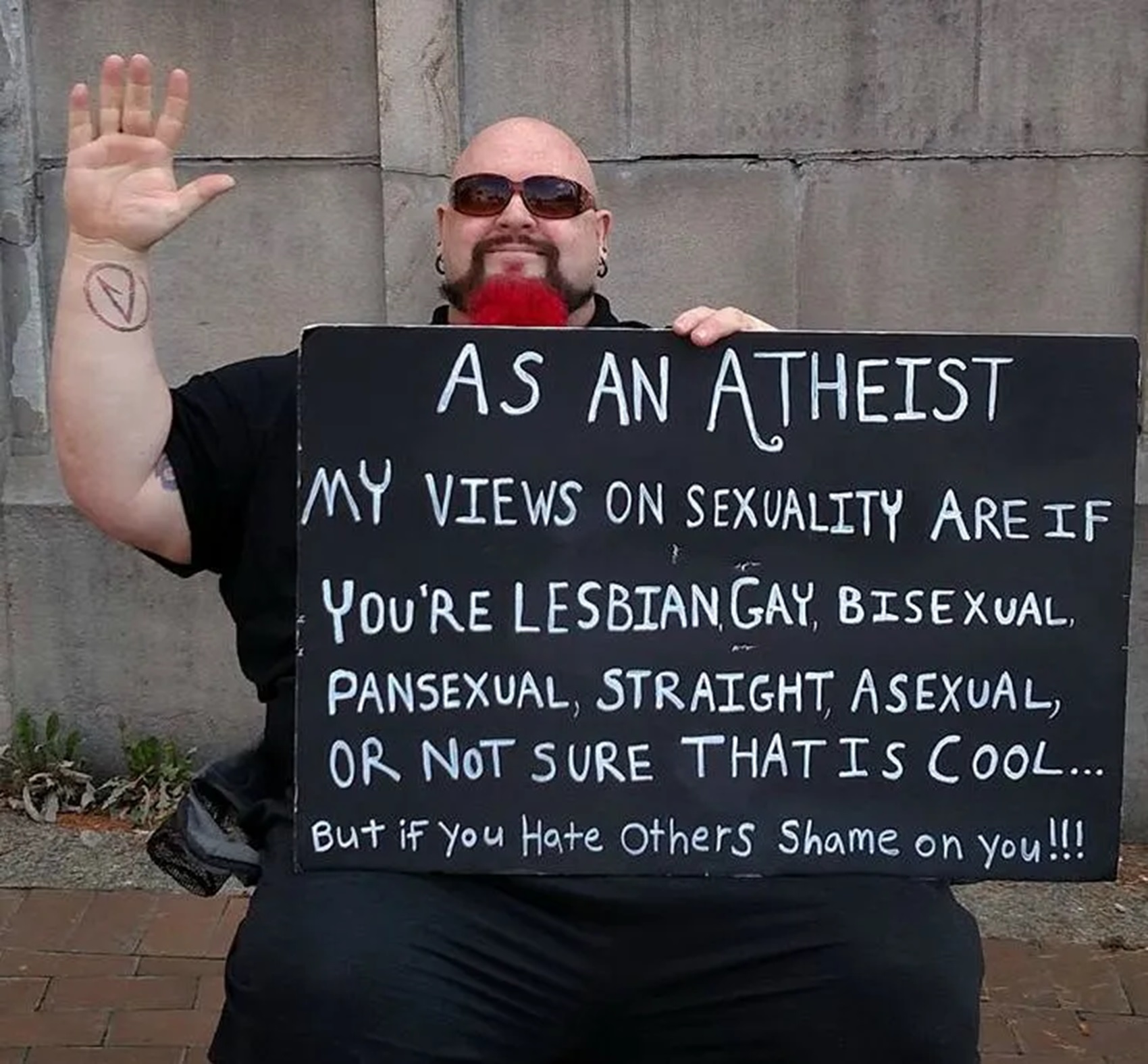
Some say they don’t see the connection between Atheism and LGBTQI rights or support.
LGBTQI: stands for Lesbian, Gay, Bisexual, Transgender, Queer or Questioning, and Intersex.
Click here for: Axiological Atheist Interviews, Some involving Atheist LGBTQI People
Well to me atheists should be informed by reality and science, which explains how variation in sexuality and sexual orientation is biological and observed in nature thus should be seen as normal. Psychology and sociology help us confirm that variety in sexuality and sexual orientation is healthy and valued. As atheists, we should realize that it is only us in the world, so caring and respecting our fellow humans is a needed part of our shared humanity. I want to make a difference in the world and try to bring hope and new thinking to others where I can. I also wish to champion kindness as often as I champion challenge in thinking and hope for wisdom as much as reason or doubt. I see it is easier to break others down than help them see a way back up. More than just my disbelief in religion and gods or all woo-woo, I hope people get how much I care about humanity and all the different people who are apart of it. We rise by helping each other. May I be thoughtful and care, as well as seek knowledge and share. May we all be good humans to ourselves and others.
Ethics not gods
Addressing The Ethics of Belief
Truth Navigation: “Belief-Etiquette”
Good Belief-Etiquette = Disciplined-Rationality (addressing The Ethics of Belief)
Addressing The Ethics of Belief and Logical Fallacies
Gods at best are unknown, thus are irrelevant, so just say NO to divine morals. And to humanity, which we do know, and its human-derived ethics, just say YES. Hammer of Truth: Yes, you too, have lots of beliefs…
Ethics Before EGO!
Some people seem to think EGO is simply a positive internal sense of self (some kind of strength).
Whereas, I mainly see it as a negative internal selfishness (a kind of weakness).
How often we wish to be understood and how little we wish to be the one with understanding. As a theist, the world was like magic and the god I believed in could do anything, so, to me, I thus had less awe and wonder. But now as an atheist with no magic in the world with only natural processes, therefore, I have more awe and wonder. The need for love and connection is indeed quite universal, so we should see the need to be as loving as we can.
What Harm does Our Pride or Ego Do?
*It often pushes people away from you than draws them to you.
*It often stops you from growing or even seeing a need to change.
*It often blocks love from coming into your life but may add more strife.
*It often kills your happiness rather than producing it.
*It makes you a less critical thinker but more criticizing and irrational than an openminded clear thinker.
To me, empathy is the flower of care or kindness expressed as the result of a heart blooming with compassion over EGO.
Be a person of honor:
*Be open minded
*Be understanding
*Be thoughtful
*Be informed
*Be honest
*Be caring
*Be helpful
*Be kind
I am a work in progress. The journey may be long but indeed worth it. And my arms are wide open for perfection. I looked out at the world and was ashamed. I realized I must do what must be done, I must be one of the few who care. May the desires of my heart include a love for humanity and a care to do what I can to help. We rise by helping each other and I am always trying to improve me, thus the world around me. May I not be a silent watcher of injustice. May my valor be found in my heart for humanity and not my ego. A mind unwilling to be wrong is a mind unwilling to learn. Don’t allow anger to become an unethical behavior. Empathy is not limiting one’s care to only themselves. Empathy: to think in another’s thinking, feel their feelings, and care about their experience.
May I be a person of kindness:
- Nice behavior
- Nice language
- Nice Voice
Dignity, in my thinking, involves/encompass a phenomenological/psychological-awareness/cognitive-realization and the emotional sensitivity of our sense of self or the emotional understanding about our sense of self.
What we need to understand as well as acknowledge is how we should honor others who are fellow dignity beings and the realization of the value involved in that. As well as strive to understand how an attack to a person’s “human rights” is an attack to the value and worth of a dignity being.
Our dignity is involved when you feel connected: feelings with people, animals, plants, places, things, and ideas. Our dignity is involved when we feel an emotional dignity bond “my god”, “my religion”, “my faith”, “my family”, “my pet”, “my sport’s team” etc. This involvement of emotional dignity bond will indeed make the challenging of peoples “god”, “religion”, or “faith” such a difficult task and requires a skilled navigation to get them to see things differently but it can be done.
Dignity arises in our emotional awareness depending on cognition.
May my lips be sweetened with words of encouragement and compassion. May my Heart stay warm in the arms of kindness. May my life be an expression of love to the world.
To me when we say it’s wrong to kill a human, that person is appealing to our need to value the dignity of the person.’ The person with whom may possibly be killed has a life essence with an attached value and moral weight variations. And moral weight,’ which is different depending on the value of the dignity being you are addressing understanding moral weight as a kind of liability, responsibility, or rights is actualized.
So, it’s the dignity to which we are saying validates the right to life. But I believe all living things with cognitively aware have a dignity. As to me, dignity is the name I home to the emotional experience, emotional expression, emotional intelligence or sensitivity at the very core of our sense of self the more aware the hire that dignity value and thus worth. I am not just different in my thinking on one subject, rather I am usually refined in all my thoughts. Rationalist is my nature, anti-authoritarian thinking is my methodology, atheism is my conclusion, Ignostic is my opinion, antitheism, as well as antireligionism, are my value judgments and anarchistic humanitarianism is my motivation. People are assholes, but then I remembered I too am people; and thus, I saw how I am responsible.
“Damien, so what do you think are the best ways to cultivate dignity?” – Questioner
My response, dignity is not a fixed thing and it feels honored or honoring others as well as help self-helping and other-helping; like ones we love or those in need, just as our dignity is affected by the interactions with others. We can value our own dignity and we can and do grow this way, but as I see it because we are social animals, we can usually we cannot fully flourish with our dignity. Thus dignity is emotionally needy for other dignity beings that is why I surmise at least a partially why we feel empathy and compassion or emotional bonds even with animals is a dignity awareness and response. Like when we say “my pet” cat one is acknowledging our increased personal and emotional connecting. So, when we exchange in experiences with say a pet animal what we have done is we raise their dignity.
To me, our dignity flourishes with acceptance, understanding, and support. Moreover, our dignity, in a sense, withers with rejection, misunderstanding, and opposition. Dignity thus in my thinking is the emotional sensitivity of our sense of self or the emotional understanding about our sense of self.
Dignity: Containing Value, and Moral Weight
“Admit it, Damien: How hard is it to challenge the mentally-challenged?” – Challenger
My response, I have just gotten better as I even better know what I will always try in my attacks Ontology, (understanding the thingness of things; like what is or can be real, like not god) epistemology, (understanding what you know or can know; as in you do have anything in this reality to know anything about this term you call god, and no way of knowing if There is anything non-naturalism beyond this universe and no way to state any about it if there where) and then end with axiology (understanding what is good or valuable as well as what is evil or unvaluable like how the stories about theist theistic gods are often racist, sexist, homophobic, transphobic intersexphobic, xenophobic, etc. Thus they are directly against humanity and thus are evil and unvaluable. Unvaluable; as in the god concept you have is evil and demonstrably harmful and thus is highly unvaluable to humanity).
Why care? Well because we are cognitively advanced emotionally aware beings with fragile psychologies desperately needing of prosocial interactions with others. To me, we bloom in kindness and wither under unkindness, and we are prone to mental anguish from a trauma that can list a lifetime. We simply need people, and they need us. And because kindness is like chicken soup to the essence of who we are, by validating the safety needs of our dignity.
As I see it now, how odd I find it to have prejudice or bigotry against other humans who are in fact previous fellow beings of dignity, we too often get blinded by the external packaging that holds a being of dignity internally.
The common concept of dignity is often similar to my thinking of Dignity:
“Moral, ethical, legal, and political discussions use the concept of dignity to express the idea that a being has an innate right to be valued, respected, and to receive ethical treatment. In the modern context, dignity can function as an extension of the Enlightenment-era concepts of inherent, inalienable rights. English-speakers often use the word “dignity” in prescriptive and cautionary ways: for example in politics it can be used to critique the treatment of oppressed and vulnerable groups and peoples, but it has also been applied to cultures and sub-cultures, to religious beliefs and ideals, to animals used for food or research, and to plants. “Dignity” also has descriptive meanings pertaining to human worth. In general, the term has various functions and meanings depending on how the term is used and on the context” ref
25 Ways To Kill The Toxic Ego That Will Ruin Your Life
By Ryan Holiday
How do we keep this toxic ego and selfishness at bay? How do we prevent ego from “sucking us down like the law of gravity?” The primary answer is simple: awareness. But after that, it’s a matter of hard work. In the course of researching Ego is the Enemy I was exposed to many strategies for combatting our arrogant and selfish impulses. Here are 25 proven exercises from successful men and women throughout history that will help you stay sober, clear-headed, creative and humble. They work if you work them.
1. Adopt the beginner’s mindset. “It is impossible to learn that which one thinks one already knows,” Epictetus says. When we let ego tell us that we have arrived and figured it all out, it prevents us from learning. Pick up a book on a subject you know next to nothing about. Walk through a library or a bookstore—remind yourself how much you don’t know.
2. Focus on the effort—not the outcome. With any creative endeavour at some point what we made leaves our hands. We can’t let what happens after that point have any sway over us. We need to remember famous coach John Wooden’s advice: “Success is peace of mind, which is a direct result of self satisfaction in knowing you made the effort to do your best to become the best that you are capable of becoming.” Doing your best is what matters. Focus on that. External rewards are just extra.
3. Choose purpose over passion. Passion runs hot and burns out, while people with purpose—think of it as passion combined with reason—are more dedicated and have control over their direction. Christopher McCandless was passionate when he went “into the wild” but it didn’t work well, right? The inventor of the Segway was passionate. Better to have clear-headed purpose.
4. Shun the comfort of talking and face the work. “Void,” Marlon Brando once said, “is terrifying to most people.” We talk endlessly on social media getting validation and attention with fake internet points avoiding the uncertainty of doing the difficult and frightening work required of any creative endeavour. As creatives we need to shut up and get to work. To face the void—despite the pain of doing so.
5. Kill your pride before you lose your head. “Whom the gods wish to destroy,” Cyril Connolly wrote, “they first call promising.” You cannot let early pride lead you astray. You must remind yourself everyday how much work is left to be done, not how much you have done. You must remember that humility is the antidote to pride.
6. Stop telling yourself a story—there is no grand narrative. When you achieve any sort of success you might think that success in the future is just the natural and expected next part of the story. This is a straightforward path to failure—by getting too cocky and overconfident. Jeff Bezos, the founder of Amazon, reminds himself that there was “no aha moment” for his billion-dollar behemoth, no matter what he might read in his own press clippings. Focus on the present moment, not the story.
7. Learn to manage (yourself and others). John DeLorean was a brilliant engineer but a poor manager (of people and himself). One executive described his management style as “chasing colored balloons”—he was constantly distracted and abandoning one project for another. It’s just not enough to be smart or right or a genius. It’s gratifying to be the micromanaging egotistical boss at the center of everything—but that’s not how organizations grow and succeed. That’s not how you can grow as a person either.
8. Know what matters to you and ruthlessly say no to everything else. Pursue what the philosopher Seneca refers to as euthymia—the tranquility of knowing what you are after and not being distracted by others. We accomplish this by having an honest conversation with ourselves and understanding our priorities. And rejecting all the rest. Learning how to say no. First, by saying no to ego which wants it all.
9. Forget credit and recognition. Before Bill Belichick became the four-time Super Bowl–winning head coach of the New England Patriots, he made his way up the ranks of the NFL by doing grunt work and making his superiors look good without getting any credit. When we are starting out in our pursuits we need to make an effort to trade short-term gratification for a long-term payoff. Submit under people who are already successful and learn and absorb everything you can. Forget credit.
10. Connect with nature and the universe at large. Going into nature is a powerful feeling and we need to tap into it as often as possible. Nothing draws us away from it more than material success. Go out there and reconnect with the world. Realize how small you are in relation to everything else. It’s what the French philosopher Pierre Hadot has referred to as the “oceanic feeling.” There is no ego standing beneath the giant redwoods or on the edge of a cliff or next to the crashing waves of the ocean.
11. Choose alive time over dead time. According to author Robert Greene, there are two types of time in our lives: dead time, when people are passive and waiting, and alive time, when people are learning and acting and utilizing every second. During failure, ego picks dead time. It fights back: I don’t want this. I want ______. I want it my way. It indulges in being angry, aggrieved, heartbroken. Don’t let it—choose alive time instead.
12. Get out of your own head. Writer Anne Lamott knows the dangers of the soundtrack we can play in our heads: “The endless stream of self-aggrandizement, the recitation of one’s specialness, of how much more open and gifted and brilliant and knowing and misunderstood and humble one is.” That’s what you could be hearing right now. Cut through that haze with courage and live with the tangible and real, no matter how uncomfortable.
13. Let go of control. The poisonous need to control everything and micromanage is usually revealed with success. Ego starts saying: it all must be done my way—even little things, even inconsequential things. The solution is straightforward. A smart man or woman must regularly remind themselves of the limits of their power and reach. It’s simple, but not easy.
14. Place the mission and purpose above you. During World War II, General George Marshall, winner of the Nobel Peace Prize for the Marshall Plan, was practically offered the command of the troops on D-Day. Yet he told President Roosevelt: “The decision is yours, Mr. President; my wishes have nothing to do with the matter.” It came to be that Eisenhower led the invasion and performed with excellence. Marshall put the mission and purpose above himself—an act of selflessness we need to remind ourselves of.
15. When you find yourself in a hole—stop digging. “Act with fortitude and honor,” Alexander Hamilton wrote to a distraught friend in serious trouble of the man’s own making. “If you cannot reasonably hope for a favorable extrication, do not plunge deeper. Have the courage to make a full stop.” Our ego screams and rattles when it is wounded. We will then do anything to get out of trouble. Stop. Don’t make things worse. Don’t dig yourself further. Make a plan.
16. Don’t be deceived by recognition, money and success—stay sober. Success, money and power can intoxicate. What is required is those moments is sobriety and a refusal to indulge. One look at Angela Merkel, one of the most powerful women on the planet is revealing. She is plain and modest—one writer said that unpretentiousness is Merkel’s main weapon—unlike most world leaders intoxicated with position. Leave self-absorption and obsessing over one’s image for the egotists.
17. Leave your entitlement at the door. Right before he destroyed his own billion-dollar company, Ty Warner, creator of Beanie Babies, overrode the objections of one of his employees and bragged, “I could put the Ty heart on manure and they’d buy it!” You can see how this manifestation of ego can lead you to success—and how it can lead to downright failure.
18. Choose love. Martin Luther King understood that hate is like an “eroding acid that eats away the best and the objective center of your life.” Hatred is when ego turns a minor insult in a massive sore and it lashes out. But pause and ask: has hatred and lashing out ever helped anyone with anything? Don’t let it eat at you—choose love. Yes, love. See how much better you feel.
19. Pursue mastery in your chosen craft. When you are pursuing a craft you realize that the better you get, the humbler you are. Because you understand there’s always something you can learn and you are inherently humbled by this fascinating craft or career you’re after. It is hard to get a big head or become egotistical when you’ve decided on that path.
20. Keep an inner scorecard. Just because you won doesn’t mean you deservedto. We need to forget other people’s validation and external markers of success. Warren Buffett has advised keeping an inner scorecard versus the external one. Your potential, the absolute best you’re capable of—that’s the metric to measure yourself against.
21. Paranoia creates things to be paranoid about. “He who indulges empty fears earns himself real fears,” wrote Seneca, who as a political adviser witnessed destructive paranoia at the highest levels. If you let ego think that everyone is out to get you you will seem weak…and then people will really try to take advantage of you. Be strong, confident and forgiving.
22. Always stay a student. Put yourself in rooms where you’re the least knowledgeable person. Observe and learn. That uncomfortable feeling, that defensiveness that you feel when your most deeply held assumptions are challenged? Do it deliberately. Let it humble you. Remember how the physicist John Wheeler put it, “As our island of knowledge grows, so does the shore of our ignorance.”
23. No one can degrade you—they degrade themselves. Ego is sensitive about slights, insults and not getting their due. This is a waste of time. After Frederick Douglass was asked to ride in a baggage car because of his race, someone rushed to apologize for this mistreatment. Frederick’s reply? “They cannot degrade Frederick Douglass. The soul that is within me no man can degrade. I am not the one that is being degraded on account of this treatment, but those who are inflicting it upon me.”
24. Stop playing the image game—focus on a higher purpose. One of the best strategists of the last century, John Boyd, would ask the promising young acolytes under him: “To be or to do? Which way will you go?” That is, will you choose to fall in love with the image of how success looks like or you focus on a higher purpose? Will you pick obsessing over your title, number of fans, size of paycheck or on real, tangible accomplishment? You know which way ego wants to go.
25. Focus on the effort—not the results. This is so important it is appearing twice. If you can accept that you control only the effort that goes in and not the results which come out, you will be mastering your ego. All work leaves our hands at some point. Ego wants to control everything—but it cannot control other people or their reactions. Focus on your end of the equation, leave them to theirs. Remember Goethe’s line: “What matters to an active man is to do the right thing; whether the right thing comes to pass should not bother him.”
I love H.O.M.E. “Honor, Open, Motivate, & Embrace”
Caring firebrand atheism vs. Christian nationalism and dominionism
Caring Firebrand Atheist Activism Indianapolis, Indiana 2018
Homophobia, Transphobia, and Genderqueerphobia Hurts Us All
I am a caring firebrand axiological atheist, wishing to be hard on ideas but kind to people.
LGBTQI and Personhood Explored
Deconstructing Pseudo-Morality with Axiology Understanding?
- I am an Axiological Atheist, with a Rationalist Persuasion, who Supports Anarcho-Humanism
- I am a caring firebrand axiological atheist, wishing to be hard on ideas but kind to people.
- Caring Firebrand Axiological Atheist, Antitheist, and Antireligionist as a Valuized Ethical Duty.
- Axiological Atheism Starts in Apatheism?
- Truth is a Value (axiological) Judgment.
- Axiological Atheism is Intellectualism
- Axiological Atheist Damien Marie AtHope interviews BABA BRINKMAN
- “Value Theory/Value Science” atheism: AXIOLOGICAL ATHEISM
- Is bible god ethical? & Would It Be Bad or Good if God Exists? (axiological “value theory” questions)
- Moral fear and Moral love (which together motivate my axiological ethics)?
- Axiological Dignity: “Value Consciousness vs Value-Blindness”
- Axiological/axiology (value theory/value science) Atheism?
- My Atheism: “Axiological Atheism”
- Axiological Atheist Interviews
- Axiological Atheism not Nihilist Atheism
- My quick definition of Axiology and Axiological Atheism?
- Applying Axiological Thinking
Get Behind Me With your Pseudo Religious-Morality
You look down on me without just cause, ranting your religious beliefs as if they have real value. However, your Pseudo Religious-Morals don’t even interest me, as if they have a real universal benefit to humanity, which they do not! So, yes, to you and your pseudo-moralistic thinking, I may express fallen morals. However, in this charge, I am proudly fallen, from such vile mental pollution as your pseudo-morality. And in so doing, I communicate respect and value for real morality indeed. But may I remind you, not only do I not need your fallen Pseudo Religious-Morals, I am demonstrably better off without them as I have TRUE reason uplifted universal-ethics, and that is something you don’t seem to demonstrate with any real accuracy, and for this, I look down on you with just cause. I hope I am always strong enough to put my morality at the forefront in all I do, so much so, that it is obvious in the ways I think and behave.
Axiological Morality Critique of Pseudo-Morality/Pseudomorality?
Real Morality vs. Pseudo Morality
“Real Morality vs. Pseudo Morality?”
+Morals (Personal Morality relating to a “self” morality): are not held by all in the same way since all are not held to Orthodox faith and though most start with good and bad or right and wrong values, which usually are personally, familially, socially or religiously give or in some way otherworldly defined, thus not universal.
+Ethics (Social Morality relating to a “others” morality): Ethics are not constrained by a given religion’s value systems to motivate its ideas of right and wrong instead it relies on universal truths found in universal principles of just human action. Ethics is set standers uses to personally engage with others and universal truths assist goals of universal ethical standards. Thus, ethics are general prosocial prescription we as morality aware beings in a rather universal way tend to have some awareness of and it is not just an awareness as in one who holds to ethics often get it applies to all peoples. Some may wish to devalue people but to do so is not really unethical, though often it can lead to unethical behavior. So what I am trying to highlight is how in the behavior that the ethics violation could occur as the internal attitude of devaluing others would only be a possible morals violation such as one who valued virtue and not getting it but failing by the persuasion of devaluing the life of other humans. This simple internal devaluing of humans, that they may be doing is vile. But ethics would not be involved until public behaviors with others, as such ethics is not so much a persuasion as an adherence to a standard(s) that should cover all thus it is highly applicable to utilize in environmental decision making.
Religions Promote Pseudo-Morality
Understanding Religion Evolution:
- Animism (Africa: 100,000 years ago), (Animism | Britannica.com)
- Totemism (Europe: 50,000 years ago), (Totemism – Anthropology)
- Shamanism (Siberia: 30,000 years ago), (Shamanism | Britannica.com)
- Paganism (Turkey: 12,000 years ago), (BBC – Religion: Paganism)
- Progressed organized religion (Egypt: 5,000 years ago), (Prehistoric Egypt 40,000 years ago to The First Dynasty 5,150 years ago)
“Religion is an Evolved Product”
I am an Out Atheist, Antitheist, and Antireligionist as a Valuized Ethical Duty.
How can we silently watch as yet another generation is indoctrinated with religious faith, fear, and foolishness? Religion and it’s god myths are like a spiritually transmitted disease of the mind. This infection even once cured holds mental disruption which can linger on for a lifetime. What proof is “faith,” of anything religion claims by faith, as many people have different faith even in the same religion? When you start thinking your “out, atheism, antitheism or antireligionism is not vitally needed just remember all the millions of children being indoctrinated and need our help badly and who desperately need our help with the truth. Three things are common in all religions: “pseudo-science,” “pseudo-history,” and “pseudo-morality.” And my biggest thing of all is the widespread forced indoctrination of children, violating their free choice of what to not believe or believe, I hate forced hereditary religion.
- Axiology, Morality and the Dignity Being: “Human Entity”
- MORALITY: values, morals, and ethics
- Axiological Ethics not Pseudo Morality
- Morality: all subjective or all objective?
- Think there is no objective morality?
- I have questions for someone believing all morality is subjective
- Reason, Morality, and Emotions?
- Real Morality: Emotional Shame?
- Believe in Good, Humanist Morality?
- Natural Morality?
- Atheist Morality = Scientific Morality?
- Bible Morality and a Genocidal god of Watery Death?
- Axiological Atheism Morality Critique: of the bible god
- How Do I Gain a Morality Persuasion or Make a Change to it?
- Justice in the Workplace: morality/ethical dimensions
- No God: No evidence, No intelligence, and No goodness = Valid Atheism Conclusion
No God: No evidence, No intelligence, and No goodness = Valid Atheism Conclusion
- No evidence, to move past the Atheistic Null Hypothesis: There is no God/Gods (in inferential statistics, a Null Hypothesis generally assumed to be true until evidence indicates otherwise. Thus, a Null Hypothesis is a statistical hypothesis that there is no significant difference reached between the claim and the non-claim, as it is relatively provable/demonstratable in reality some way. “The god question” Null Hypothesis is set at as always at the negative standard: Thus, holding that there is no God/Gods, and as god faith is an assumption of the non-evidentiary wishful thinking non-reality of “mystery thing” found in all god talk, until it is demonstratable otherwise to change. Alternative hypothesis: There is a God (offered with no proof: what is a god and how can anyone say they know), therefore, results: Insufficient evidence to overturn the null hypothesis of no God/Gods.
- No intelligence, taking into account the reality of the world we do know with 99 Percent Of The Earth’s Species Are Extinct an intelligent design is ridiculous. Five Mass Extinctions Wiped out 99 Percent of Species that have ever existed on earth. Therefore like a child’s report card having an f they need to retake the class thus, profoundly unintelligent design.
- No goodness, assessed through ethically challenging the good god assumptions as seen in the reality of pain and other harm of which there are many to demonstrates either a god is not sufficiently good, not real or as I would assert, god if responsible for this world, would make it a moral monster ripe for the problem of evil and suffering (Argument from Evil). God would be responsible for all pain as life could easily be less painful and yet there is mass suffering. In fact, to me, every child born with diseases from birth scream out against a caring or loving god with the power to do otherwise. It could be different as there is Congenital insensitivity to pain (CIP), also known as congenital analgesia, in which a person cannot feel (and has never felt) physical pain.[1]
Disproof by logical contradiction
“A Logical Impossibility”
I am an Axiological (Theoretical and Normative VALUE Theorist philosopher) Atheist
Axiology and Value Theory?
Theoretical philosophy? – Wikipedia
“The division of philosophy into a practical and a theoretical discipline has its origin in Aristotle‘s moral philosophy and natural philosophy categories. Theoretical philosophy is sometimes confused with Analytic philosophy, but the latter is a philosophical movement, embracing certain ideas and methods but dealing with all philosophical subject matters, while the former is a way of sorting philosophical questions into two different categories in the context of a curriculum. – Wikipedia
Here are examples of theoretical philosophy subjects I delve into:
- Ontology
- Epistemology
- Axiology
- Ignosticism
- Rationalism
- Antitheism
- Antireligion
- Anarchism
- Secularism
- Secular humanism
- Humanism
- Theories of truth
- Questions on knowledge
- Practical philosophy
- Logic
- Questions on Morality
- Feminist philosophy
- Philosophy of science
- Philosophy of language
- Philosophy of mind
- Metaphysics
Noradrenaline and our Presumptions of Reality (regulation of the Brain’s ‘Inner World’)?
Axiological “Presumptive-Value”
Your god myth is an Axiological “Presumptive-Value” Failure
I am an Axiological (value theorist) Atheist, and Claims of god are a Presumptive-Value failure. Simply, if you presume a thing is of value that you can’t justify, then you have committed an axiological presumptive value failure.
Axiological “presumptive-value” Success: Sound Thinker: uses disciplined rationality (sound axiological judgment the evaluation of evidence to make a decision) supporting a valid and reliable justification.
Axiological “presumptive-value” Failure: Shallow Thinker: undisciplined, situational, sporadic, or limited thinking (unsound axiological judgment, lacking required evidence to make a “presumptive-value” success decision) lacking the support of a needed valid and reliable justification.
“Ok, So basically, the difference between reasoning with evidence and without?” – Questioner
My response, Well with or without valid justification because of evidence. As in you can’t claim to know the value of something you can’t demonstrate as having good qualities to attach the value claim too so if you lack evidence of the thing in question then you cannot validate its value. So it’s addressing justificationism (uncountable) Theory of justification, An (philosophy standard) approach that regards the justification of a claim as primary, while the claim itself is secondary; thus, criticism consists of trying to show that a claim cannot be reduced to the authority or criteria that it appeals to. Think of is as a use-matrix. If I say this is of great use for that, can you validate its use or value, and can I use this as a valid method to state a valid justification for my claims without evidence to value judge from? No, thus an axiological presumptive-value failure as a valid anything. Theory of justification is a part of epistemology that attempts to understand the justification of propositions and beliefs. Epistemologists are concerned with various epistemic features of belief, which include the ideas of justification, warrant, rationality, and probability. Loosely speaking, justification is the reason that someone (properly) holds a belief. When a claim is in doubt, justification can be used to support the claim and reduce or remove the doubt. Justification can use empiricism (the evidence of the senses), authoritative testimony (the appeal to criteria and authority), or reason. – Wikipedia
“Presumptions are things that are credited as being true until evidence of their falsity is presented. Presumptions have many forms and value (Axiology) is just one. In ethics, value denotes the degree of importance of something or action, with the aim of determining what actions are best to do or what way is best to live (normative ethics), or to describe the significance of different actions. It may be described as treating actions as abstract objects, putting VALUE to them. It deals with right conduct and living a good life, in the sense that a highly, or at least relatively high valuable action may be regarded as ethically “good” (adjective sense), and that an action of low value, or relatively low in value, may be regarded as “bad”. What makes an action valuable may, in turn, depend on the ethic values of the objects it increases, decreases or alters. An object with “ethic value” may be termed an “ethic or philosophic good” (noun sense). Values can be defined as broad preferences concerning appropriate courses of actions or outcomes. As such, values reflect a person’s sense of right and wrong or what “ought” to be. “Equal rights for all”, “Excellence deserves admiration”, and “People should be treated with respect and dignity” are representatives of values. Values tend to influence attitudes and behavior and these types include ethical/moral values, doctrinal/ideological(religious, political) values, social values, and aesthetic values. It is debated whether some values that are not clearly physiologically determined, such as altruism, are intrinsic, and whether some, such as acquisitiveness, should be classified as vices or virtues.” ref, ref
“Sound thinking to me, in a general way, is thinking, reasoning, or belief that tends to make foresight a desire to be as accurate as one can with valid and reliable reason and evidence.”
Sound axiological judgment, to me, a “presumptive-value” success, is value judged opinions expressed as facts with a valid and reliable justification. In an informal and psychological sense, it is used in reference to the quality of cognitive faculties and adjudicational (relating to adjudication) capabilities of particular individuals, typically called wisdom or discernment. In a legal sense, – used in the context of a legal trial, to refer to a final finding, statement, or ruling, based on a considered weighing of evidence, called, “adjudication“.
Sound Thinkers don’t value FAITH
Sound thinking to me, in a general way, is thinking, reasoning, or belief
that tends to make foresight a desire to be as accurate as one can
with valid and reliable reason and evidence.
Dogmatic–Propaganda vs. Disciplined-Rationality
Religionists and fideists, promote Dogmatic-Propaganda whereas atheists and antireligionists mostly promote Disciplined-Rationality. Dogmatic–Propaganda commonly is a common motivator of flawed or irrational thinking but with over seventy belief biases identified in people, this is hardly limited to just the religious or faith inclined. Let me illustrate what I am saying, to me all theists are believing lies or irrationally in that aspect of their lives relating to god belief. So the fact of any other common intellectual indexers where there may be right reason in beliefs cannot remove the flawed god belief corruption being committed. What I am saying is like this if you kill one person you are a killer. If you believe in one “god” I know you are a follower of Dogmatic-Propaganda and can not completely be a follower of Disciplined-Rationality. However, I am not proclaiming all atheists are always rational as irrationally is revolving door many people believe or otherwise seem to stumble through. It’s just that god belief does this with intentionally.
Disciplined-Rationality is motivated by principles of correct reasoning with emphasis on valid and reliable methods or theories leading to a range of rational standpoints or conclusions understanding that concepts and beliefs often have consequences thus hold an imperative for truth or at least as close to truth as can be acquired rejecting untruth. Disciplined-Rationality can be seen as an aid in understanding the fundamentals for knowledge, sound evidence, justified true belief and involves things like decision theory and the concern with identifying the value(s), reasonableness, verification, certainties, uncertainties and other relevant issues resulting in the most clear optimal decision/conclusion and/or belief/disbelief. Disciplined-Rationality attempts to understand the justification or lack thereof in propositions and beliefs concerning its self with various epistemic features of belief, truth, and/or knowledge, which include the ideas of justification, warrant, rationality, reliability, validity, and probability.
ps. “Sound Thinker”, “Shallow Thinker”, “Dogmatic–Propaganda” & “Disciplined-Rationality” are concepts/terms I created*
Axiological atheism can be thought to involve ethical/value theory reasoned and moral argument driven apatheism, ignosticism, atheism, anti-theism, anti-religionism, secularism, and humanism. The valuations move up the latter as the levels of evaluation is made to value judge all the elements to better understand the value or disvalue available to reach the most accurate valuation reasonable with a sound aware value conciseness. Axiological atheism can be thought to involve Ethical Atheism.
1. Apatheism: we are born and by the fact reality is devoid of magic removes theological desires to understand the obvious naturalistic world, until we learn otherwise. (a “presumptive-value” failure, thus no motivation to adequately start the evaluation needed to understand if there is real value for an Axiology assessment to accurately place it in the value hierarchy). = no value
2. Ignosticism: Sees theological arguments and language as equivocation, contradictory, and/or un-cognitively relatable other than emotionalism or the like. I see Ignosticism as using the Theological non-cognitivism arguments of “mind understanding issues” (rationalism challenging) and an evidentialist/verificationist arguments of “lacking evidence issues” (empiricism challenging). As an atheist, I am a person who disbelieves or lacks belief in the existence of god or gods. In my non-belief, I am also ignostic feeling that every theological position assumes too much about the concept of god(s). As an ignostic, I am a person who rational no idea of anything from reality whatever to label as “a concept of god” thus I can say I have no idea of anything that can connect to the term god and no reason to think anyone else can either. (again a “presumptive-value” failure, no good Ontology of the thing for Identifying values that could influence belief but without what is needed to understand if there is real value for an axiology assessment to accurately place it in the value hierarchy). = no value
3. Atheism: How can we not reject the concept of gods, aka: supposed supreme magical beings, when not even some simple magic is supported in reality. So how then is it not even more ridiculous to claim some supreme magic aka: gods which are even further from reality. May I remind you that faith in the acquisition of knowledge is not a valid method worth believing in. Because, what proof is “faith”, of anything religion claims by faith, as many people have different faith even in the same religion? As an atheist, I am a person who disbelieves or lacks belief in the existence of god or gods. In my non-belief, I am also ignostic feeling that every theological position assumes too much about the concept of god(s). As an ignostic, I am a person who rational no idea of anything from reality whatever to label as “a concept of god” thus I can say I have no idea of anything that can connect to the term god and no reason to think anyone else can either. Atheists talk about gods and religions for the same reason doctors talk about cancer, they are looking for a cure or a firefighter talking about fires because they burn people and they care to stop them. We atheists too often feel a need to help the victim’s of mental slavery, held in the bondage that is the false beliefs of gods and the conspiracy theories of reality found in religions. If you think you believe in a god, “what do you mean by god,” saying a name tells me not one thing about the thing I am asking to know “its” beingness / thingness / attributes / qualities. Thus, what is the thing “god” to which you are talking about and I want you to explain its beingness /thingness / attributes/ qualities? Religious/theistic people with supernatural beliefs often seem as though they haven’t thought much about and that is something we can help using ontology questions about the beingness / thingness / attributes/ qualities they are trying to refer too. What do you mean by god, when you use the term god? And, I am not asking you for the name you attach to the thing you label as a god. I don’t need to know what the god you believe is known “by.” I am asking, what is the thing you are naming as a god and what that thing is, its qualities in every detail like all things have if they are real. Are you just making stuff up or guessing/hoping or just promoting unjustified ideas you want to believe, what is a god? As an atheist, I feel more wonder than I did as a theist because I thought, “big deal” to any wonder I experienced, thinking god could do anything. So with such an unrealistic mindset, everything lost its wonder but it’s the opposite as an atheist. As a theist, the world was full of superstitions and supernatural magic possibilities and thus utilized thinking that was not in the real world. As an atheist all I have now is the real world, not that all atheists seem to get this, we all are in a real world devoid of magic anything, therefore, everything adds to my feeling of awe. There should be little debate with atheist acknowledging discernable reality compared to theists with non-reality claims. Yes, I have way more awe and wonder as an atheist than I ever had as a theist because as a theist anything was possible with god. Therefore, as a theist things where not that amazing. However, as an atheist grasping what an absolute accidental or how random things are, with a 95 to 99 % of all life ever existing on this planet went extinct. I am thoroughly amazed we are even here the evolved children of ancient exploded stars, likely born in galaxies born in super-massive black holes, it’s all amazing. There is no evidence for Gods. But is their proposition outside of reason? As always start in reality from the evidence we do know, such as never in the history of scientific research or investigation has any supernatural claims shown to be true. So it is completely outside of possibility and is utterly ridiculous. Therefore, belief should be rejected as there are no warrants at all and it is axiologically unworthy to such a preponderance to demand disbelief. (yet again a “presumptive value” failure, no good Ontology of the thing not the cognitively meaningful claims relatable to reality that must be attached to all magic and gods claims for Identifying values that could influence belief but without what is needed to understand if there is real value for an axiology assessment to accurately place it in the value hierarchy).
4. Antitheism: Anti-theism requires more than either merely disbelieving in gods or even denying the existence of gods. Anti-theism requires a couple of specific and additional beliefs: first, that theism is harmful to the believer, harmful to society, harmful to politics, harmful, to culture, etc.; second, that theism can and should be countered in order to reduce the harm it causes. If a person believes these things, then they will likely be an anti-theist who works against theism by arguing that it be abandoned, promoting alternatives, or perhaps even supporting measures to suppress it. It’s worth noting here that, however, unlikely it may be in practice, it’s possible in theory for a theist to be an anti-theist. This may sound bizarre at first, but remember that some people have argued in favor of promoting false beliefs if they are socially useful. To me, I think many may have a misconception of the term. Atheism and anti-theism so often occur together at the same time and in the same person that it’s understandable if many individuals fail to realize that they aren’t the same. Making a note of the difference is important, however, because not every atheist is anti-theistic and even those who are, aren’t anti-theistic all the time. Atheism is simply the absence of belief in gods; anti-theism is a conscious and deliberate opposition to theism. Many atheists are also anti-theists, but not all and not always. To me as an antitheist, I see the concept of gods antihumanistic and wholly harmful to a free humanity and if the so-called gods somehow do end up being real that I will switch to direct opposition as I would any tyrant oppressing humanity. Antitheism (sometimes anti-theism) is a term used to describe an opposition to theism. The term has had a range of applications and definitions. In secular contexts, it typically refers to direct opposition to the validity of theism, but not necessarily to the existence of a deity. As an anti-theist, I am a person who is active in opposition to theism: both the concepts of god(s) as well as the religions that support them. This is because theistic concepts and theistic religions are harmful and that even if theistic beliefs were true, they would be undesirable. (And, again a “presumptive value” failure, of the other value challenges of the lesser evaluations and value judgments addressed in theapatheism, ignosticism, atheism value judgment conclusion and an Axiological Atheism assessment of the god concept that must be attached to all magic and gods claims Identifying a lack of value and/or disvalue that influence harm to real value in an axiology assessment to accurately place its value violations in the value hierarchy).
5. Antireligionism: Not just Atheist, axiological atheists should be antitheists but this generally will involve anti-religionism. it would generally thus hold anti-religionist thinking. Especially, I am an anti-religionist, not just an atheist, and here is why summed up in three ideas I am against. And, in which these three things are common in all religions: “pseudo-science”, “pseudo-history”, and “pseudo-morality”. And my biggest thing of all is the widespread forced indoctrination of children, violating their free choice of what to not believe or believe, I hate forced hereditary religion. And my biggest thing of all is the widespread forced indoctrination of children, violating their free choice of what to not believe or believe, I hate forced hereditary religion. As well as wish to offer strong critiques regarding the pseudo-meaning of the “three letter noise” people call “G.o.d” (group originated delusion)! As an anti-religionist, I am a person who can look at religion on the whole and see it is detrimental to the progress of humanity thus am in opposition to all and every religion, not even just opposition to organized religion. In case you were wondering, I am anti-pseudoscience, anti-supernatural, and anti-superstition as well. May I not be a silent watcher as millions of children are subjugated almost before their birth let alone when they can understand thought and are forcibly coerced, compelled, constrained, and indoctrinated in the mental pollution that religion can be. My main goal against religion is to fully stop as much as possible forced indoctrination, one could ask but then why do I challenge all adults faith? well, who do you think is doing the lying to children in the first place. End Hereditary religion, if its a belief let them the equal right to choose to believe. “Religion is an Evolved Product” and Yes, Religion is Like Fear Given Wings… (And, one last time a “presumptive value” failure, of the other value challenges of the lesser evaluations and value judgments addressed in the apatheism, ignosticism, atheism value judgment conclusion and an Axiological Atheism assessment of the god concept and anti-theism assessment of the god show not just a lack of value but a possibly or likely harm demonstrating bot just a lack of value but a real disvalue and that includes the religions potentially removing value in an axiology assessment to accurately place it in the value hierarchy).
6. Secularism: is the only honorable way to value the dignity of others. If it was not true that there is a large unequal distribution of religion contributing to violence then there would be equal religion and atheist secularism violence. You do not see atheists bombing agnostics the very idea is laughable however even different branches of the same religion do will and have killed one another. So, violence not who we are it’s something we need to be compelled to do. Therefore, please support secularism. We are all one connected human family, proven by DNA showing we should treat each other as fellow dignity beings, supported equally (no gods and no masters). States may often have powers, but only citizens have the glue of morality we call rights. And, as they say, in my “dream society”, lots of things are free (aka. planting free food everywhere, free to everyone); but I wonder what you mean when people say you can’t just let things be free, I think, yeah, how can I take free stuff from a free earth. If one observes the virtues of (T. R. U. E. “The Rational Universal Ethics” or “The Responsible Universal Ethics”) that connect to all things as that of the connectedness equality like those which mirror the rays of the sun, fall down equally with a blind but fair indifference. (what is being expressed is that this sun shining will not favor one over another, no, the same upon everyone offering its light to all plant, animal, human, women, men, single or married, homosexual, bisexual, heterosexual, nonreligious, religious, people of means and those without, able-bodied and those which special needs, people of color, and those who are not, those with access to resources and those which out, young and elderly, etc.) All who wish to follow T. R. U. E. thus embodying a universalize equalitarian standard of ethics should strive to be like a ray of connected light to the world, shining equally and freedom to all of the world. By such efforts a nonbiased unitive ethical approach is possible, one would have an increase in positive feelings to help others understanding equalitarian connectedness. If you don’t think different you will not behave differently, if you have never lived differently it is hard to see things differently and if you do not strive to understand difference one is thus unknowingly or not bound by limited encapsulation. I am for a Free Secular Society. I am not for oppression or abuse of religious believer and want a free secular society with both freedoms of religion and freedom from religion. Even though I wish the end of faith and believing in myths and superstition, I wish this by means of informing the willing and not force of the unwilling. I will openly challenge and rebuff religious falsehoods and misunderstanding as well as rebuke and ridicule harmful or unethical religious ideology or behavior.
7. Humanism:is the philosophic thinking that humans can solve human problems by human means, without feeling a need to appeal to the likes of holy books, mystical anything, nor the belief in gods or religions. But, instead, aspires to a true belief in humanity, viewing it with a persuasion of equality. This caring realist thinking found in humanism utilizes an unstated assumption or aspiration, to do no harm as much as possible and to do good whenever one can. Moreover, we are all one connected human family, proven by DNA showing we should treat each other as fellow dignity beings, supported equally. And, no one really owns the earth, we may make claims to it even draw lines on maps thinking this makes the fantasy borders, illusion supported by force and the potential for threat. Thus the ethical truth is we need to share the earth as communally as possible. And use the resources as safe and ethically as possible striving towards sharing and caring. (do no Harm and do good = Humanism). My core definition of humanism is that humans can solve human problems by human means. I am not saying other things can’t or shouldn’t be added to it but to me, a definition of humanism must always contain something coherent to such a thinking or not contradict such as I have offered. Thus, why it is appropriate to say “good without god” when one is a humanist.
My life; the good, the bad, and the ugly on the road to the Mental Freedom of Atheism
- I Believe Archaeology, not Myths & Why Not, as the Religious Myths Already Violate Reason!
- Archaeological, Scientific, & Philosophic evidence shows the god myth is man-made nonsense.
- Interview of Formal Axiological Atheist Dr. William Kelleher
- “Value Theory/Value Science” atheism: AXIOLOGICAL ATHEISM
- Explaining Axiological theism, Axiological agnosticism, and Axiological atheism
- Axiological Atheism Supports Humanism & Secularism
- Psychological certainty and Epistemic certainty?
- Losing My Religion and MY Faith Addiction
- Ignostic Atheist: Do you Have a Coherent Definition of god?
- god Claims are a Non-Reality Commodity
- My Blogs on the Evolution of RELIGION
- Explaining My thoughts on the Evolution of Religion
- My Blogs Somewhat Relating to Science
- I am against Hereditary religion?
What is a god?
If you think you believe in a god, “what do you mean by god,” saying a name tells me not one thing about the thing I am asking to know “its” beingness/thingness/attributes/qualities. Thus, what is the thing “god” to which you are talking about and I want you to explain its beingness/thingness/attributes/qualities? Religious/theistic people with supernatural beliefs often seem as though they haven’t thought much about and that is something we can help using ontology questions about the beingness/thingness/attributes/qualities they are trying to refer too. What do you mean by god, when you use the term god? And, I am not asking you for the name you attach to the thing you label as a god. I don’t need to know what the god you believe is known “by.” I am asking, what is the thing you are naming as a god and what that thing is, its qualities in every detail like all things have if they are real. Are you just making stuff up or guessing/hoping or just promoting unjustified ideas you want to believe, what is a god?
Do you want what is true or want what you believe without concern for what may actually be true?
- Yes, Your Male God is Ridiculous
- Supporting Atheist Feminism: with Karen Garst and Valerie Tarico and their new book
- Feminist atheists as far back as the 1800s?
- Atheism, Feminism, and Equality?
- Value-blindness Gives Rise to Sociopathic evil.
- Homophobia, Transphobia, and Genderqueerphobia Hurts Us All
- Activism Labels Matter, thus Feminism is Needed.
- Gender defender or abuser?
- Gendered Thinking
- Black women of Courage: Elizabeth Jennings, Claudette Colvin, Rosa Parks, and Coretta Scott King.
- “No gods, no masters” is an anarchist, feminist and labor slogan.
- Interview with Dr. Laura Jean McGuire a Sexologist and Victim Advocate/ PreventionEducator
- I am Pro-Body Sovereignty and Rights Against Genital Mutilation in Females, Males, as well as Intersex Persons.
- Around 500,000 – 233,000 years ago, Oldest Anthropomorphic art (Pre-animism) is Related to Female
- Modern Humans start around 50,000 years ago Helped by Feminisation
- Survival of the Friendliest and Kindest
- Totemism: an approximately 50,000-year-old belief system?
- 40,000 – 35,000 years ago “first seeming use of a Totem” ancestor, animal, and possible pre-goddess worship?
- 31,000 – 20,000 years ago Oldest Shaman was Female, Buried with the Oldest Portrait Carving
- Shamanism: an approximately 30,000-year-old belief system
- Early Shamanism around 30,000 to 20,000 years ago: Sungar (Russia) and Dolni Vestonice (Czech Republic)
- ‘Sky Burial’ theory and its possible origins at least 12,000 years ago to likely 30,000 years ago or older.
- 27,000 – 23,000 Years Ago – Dolni Vestonice (Czech Republic) an Odd Triple Shamanistic Burial
- J DNA and the Spread of Agricultural Religion (paganism)
- Paganism: an approximately 12,000-year-old belief system
- Sedentism and the Creation of goddesses around 12,000 years ago as well as male godsafter 7,000 years ago.
- First Patriarchy: Split of Women’s Status around 12,000 years ago & First Hierarchy: fall of Women’s Status around 5,000 years ago.
- Horned female shamans and Pre-satanism Devil/horned-god Worship? at least 10,000years ago
- 9,000-8,500 year old Female shaman Bad Dürrenberg Germany
- Kurgans 6,000 years ago/dolmens 7,000 years ago: funeral, ritual, and other?
- Sun and Moon Goddesses
- Need to Mythicized: gods and goddesses
- Was the Value of Ancient Women Different?
- Are you aware that there are religions that worship women gods, explain now religion tears women down?
- Sumerian Creator Being was a Female, not Male possibly around 6,000 years ago or more
- Stars: Ancestors, Spirit Animals, and Deities (at least back to around 6,000 years ago)
- Progressed organized religion starts, an approximately 5,000-year-old belief system
- 42 Principles Of Maat (Egyptian Goddess of the justice) around 4,400 years ago, 2000 Years Before Ten Commandments
- So the 10 commandments isn’t anything to go by either right?
- Confucianism’s Tiān (Shangdi god 4,000 years old): Supernaturalism, Pantheism or Theism?
- When was the beginning: TIMELINE OF CURRENT RELIGIONS? Around 4,000 years ago.
- What is early monotheism, are Zoroastrianism (around 2,600 – 2,100 to possibly 4,000 years ago) and Atenism (around 2,140 years ago) totally monotheistic?
- Single God Religions (Monotheism) = Man-o-theism started around 4,000 years ago?
- Kultepe? An archaeological site with a 4,000 years old women’s rights document.
- The Weakening of Ancient Trade and the Strengthening of Religions around 3,000 years ago?
- Dating the BIBLE: naming names and telling times (written less than 3,000 years ago, provable to 2,200 years ago)
- Evil bible god? YES OF COURSE
- David’s Punishment for Rape? God’s “Forgiveness and Baby Killing ” (2 Samuel 12:11-14)
- Rape, Sexism and Religion?
- Sexism in the BIBLE: chapter and verse!
- All Religions are Sexist
- New Testament: bigotry, cruelty, sexism, slavery, racism, etc.
- Sexism in Taoism
- Yin and Yang is sexist with an ORIGIN around 2,300 years ago?
- Sexism in Protestantism
- Sexism in Catholicism
- Sexism in Bahaism
- Sexism in Sikhism
- Sexism in Confucianism
- Sexism in Jainism
- Sexism in Shintoism
- Sexism in Buddhism
- Sexist Buddha
- Sexism in Islam
- Sexism in Hinduism
- Sexism in Mormonism
- Sexism in Jehovah Witness
- Sexism in Christianity (New Testament)
- Sexism in Judaism (old Testament)
- Sexism, Prejudice, and Killing in Vedic Culture (Hinduism)
- Sexism in Islam? Face Covering: Religious Freedom or Religious Oppression
- Speech on the Evolution of Religion & Religious Sexism
- Sexism in the Major World Religions
- Archaeological, Scientific, & Philosophic evidence shows the god myth is man-made nonsense.
- A Different Kind of Atheist: Axiological, Methodological, Anarchist, Universal Ethicist, Realist, and Rationalist
- I am an Axiological Atheist, with a Rationalist Persuasion, who Supports Anarcho-Humanism
- Caring Firebrand Axiological Atheist, Antitheist, and Antireligionist as a Valuized Ethical Duty.
I Don’t Have to Respect Ideas
People get confused ideas are not alive nor do they have beingness, Ideas don’t have rights nor the right to even exist only people have such a right. Ideas don’t have dignity nor can they feel violation only people if you attack them personally. Ideas don’t deserve any special anything they have no feelings and cannot be shamed they are open to the most brutal merciless attack and challenge without any protection and deserve none nor will I give them any if they are found wanting in evidence or reason. I will never respect Ideas if they are devoid of merit I only respect people. When I was young it was all about me, I wanted to be liked. Then I got older and it was even more about me, I wanted power. Now I am beyond a toxic ego and it is not just about me, I want to make a difference. Sexism is that evil weed that can sadly grow even in the well-tended garden of the individual with an otherwise developed mind. Which is why it particularly needs to be attacked and exposed; and is why I support feminism. Here are four blogs on that: Activism Labels Matter, thus Feminism is Needed, Feminist atheists as far back as the 1800s?, Sexism in the Major World Religions and Rape, Sexism and Religion?
Having privilege in race, gender, sexuality, ability, class, nationality, etc. does not mean one did not have it hard in life, it just was not hard due to race, gender, sexuality, ability, class, nationality, etc. if one has privilege in that area.
Empathy: think in another’s thinking, try to feel their feeling, and care about their experience.
Theism is presented as adding love to your life… But to me, more often it peddles in ignorance (pseudo-science, pseudo-history, and pseudo-morality), tribalism (strong in-group loyalty if you believe like them and aversion to difference; like shunning: social rejection, emotional distance, or ostracism), and psychological terrorism; primarily targeting well being both safety and comfort (you are born a sinner, you are evil by nature, you are guilty of thought crimes, threats of misfortune, suffering, and torture “hell”).
Hell yes, I am against the fraud that is the world religions.
Why not be against the promotion of woo-woo pseudo-truth, when I am very against all pseudo-science, pseudo-history, and pseudo-morality and the harm they can produce. Along with the hate, such as sexism and homophobia are too often seen or the forced indoctrination of children. And this coercive indoctrination of the world religions, with their pseudo-science, pseudo-history, and pseudo-morality mainly furthered by forced Hereditary Religion (family or cultural, religious beliefs forced on children because the parent or caregiver believes that way). This is sadly done, even before a child can be expected to successfully navigate reason; it’s almost as if religious parents believe their “woo-woo pseudo-truth” lies will not be so easily accepted if they wait on a mind that can make its own choice. Because we do see how hard it is for the ones forced into Hereditary Religion. It seems difficult for them to successfully navigate reason in relation to their woo-woo pseudo-truth, found in a religion they were indoctrinationally taught to prefer, because after being instructed on how to discern pseudo-truth as truth than just wishing that their blind servitude belief in a brand of religious pseudo-truth devoid of justified, valid or reliable reason and evidence. I care because I am a rationalist, as well as an atheist.
Thus, this religious set of “woo-woo pseudo-truth” pushed on the simple-minded as truth bothers me greatly. So, here it is as simple as I can make it you first need a good thinking standard to address beliefs one may approach as a possible belief warranted to be believed. I wish to smash that lying pig of religion with the Hammer of Truth: Ontology, Epistemology, and Axiology Questions (a methodological use of philosophy). Overall, I wish to promote in my self and for others; to value a worthy belief etiquette, one that desires a sound accuracy and correspondence to the truth: Reasoned belief acquisitions, good belief maintenance, and honest belief relinquishment. May we all be authenticly truthful rationalists that put facts over faith.
I have made many mistakes in my life but the most common one of all is my being resistant to change. However, now I wish to be more, to be better, as I desire my openness to change if needed, not letting uncomfortable change hold me back. May I be a rationalist, holding fast to a valued belief etiquette: demanding reasoned belief acquisitions, good belief maintenance, and honest belief relinquishment.
Truth Navigation: Techniques for Discussions or Debates
I do truth navigation, both inquiry questions as well as
strategic facts in a tag team of debate and motivational teaching.
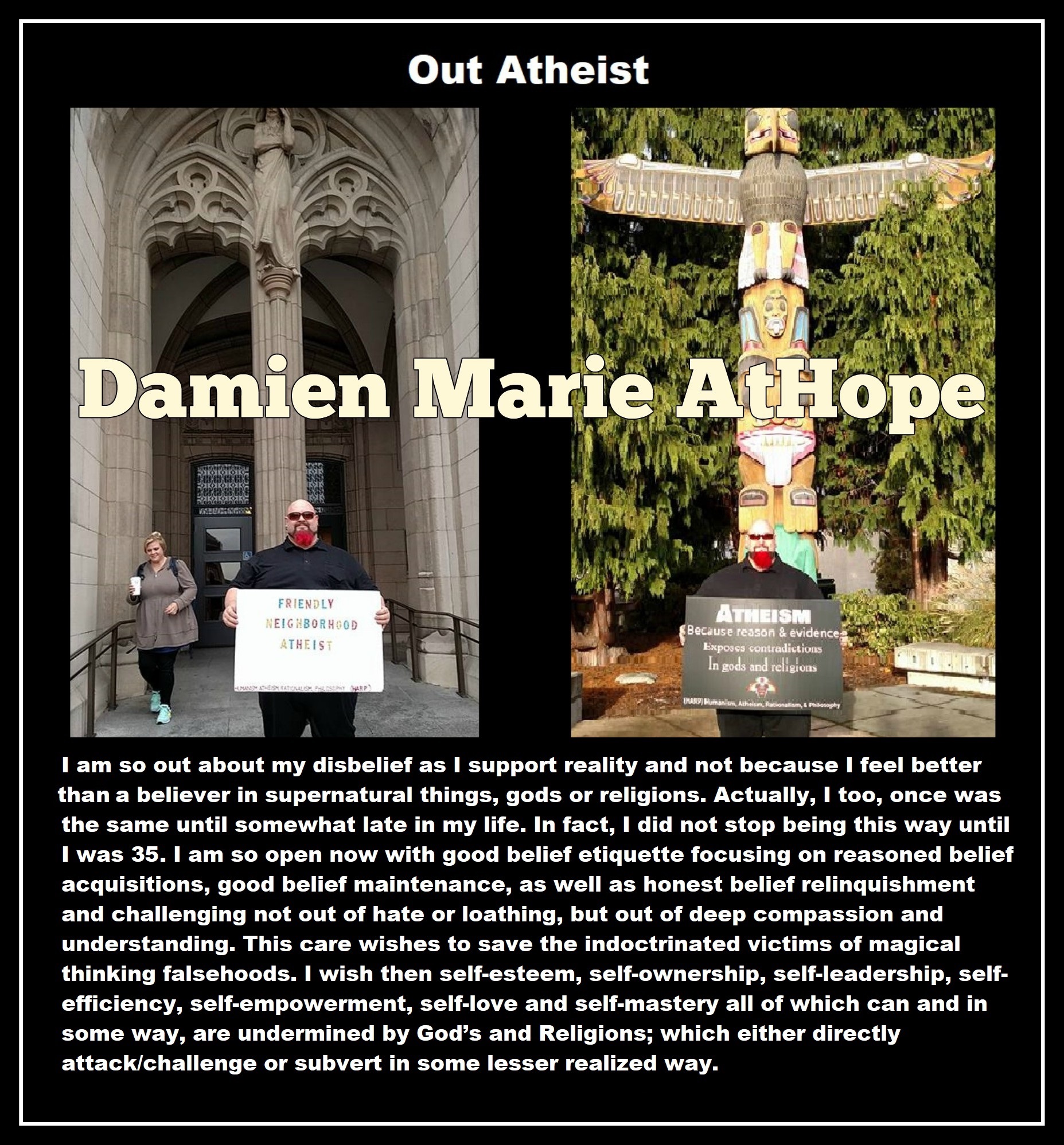


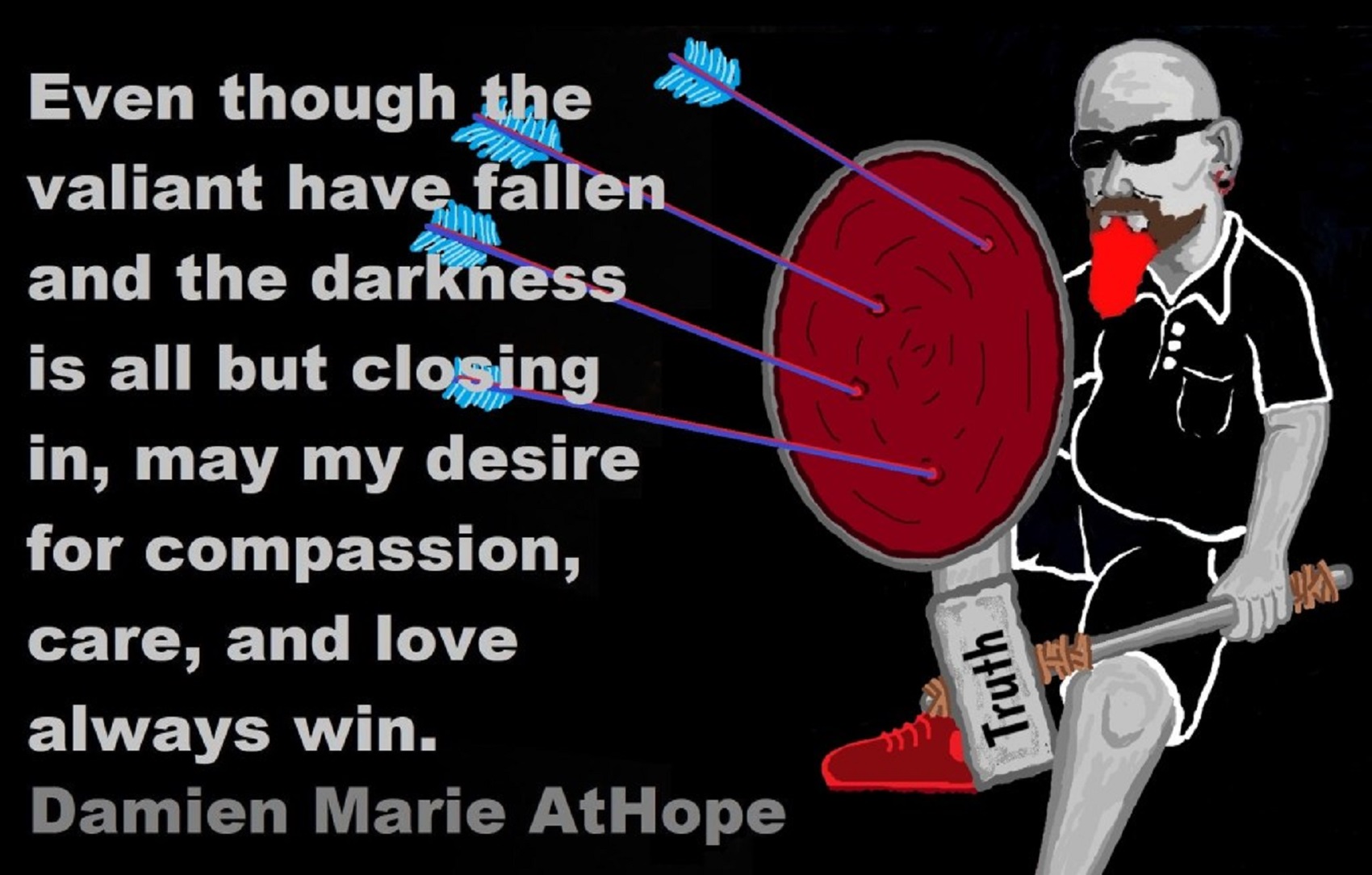
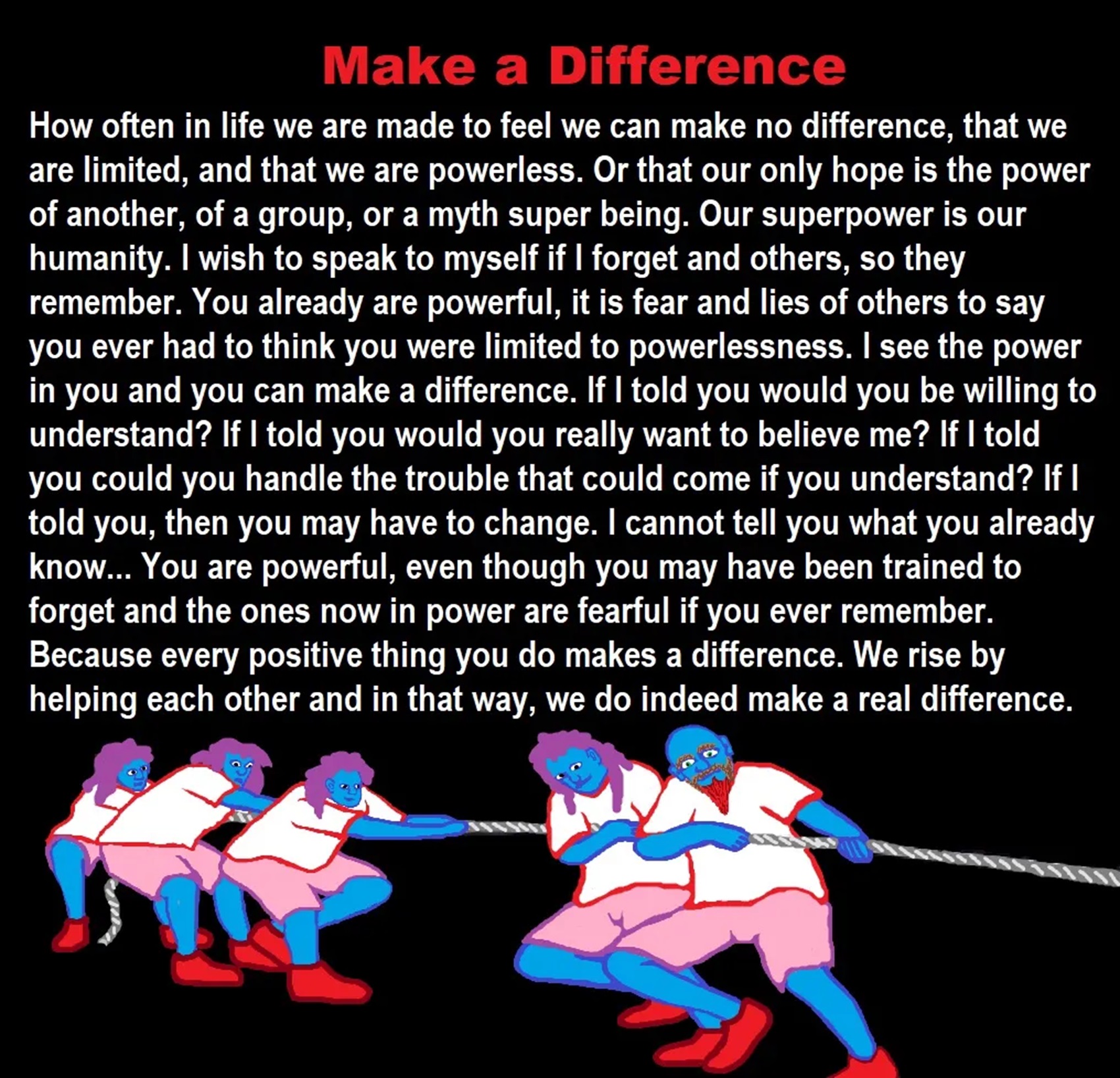

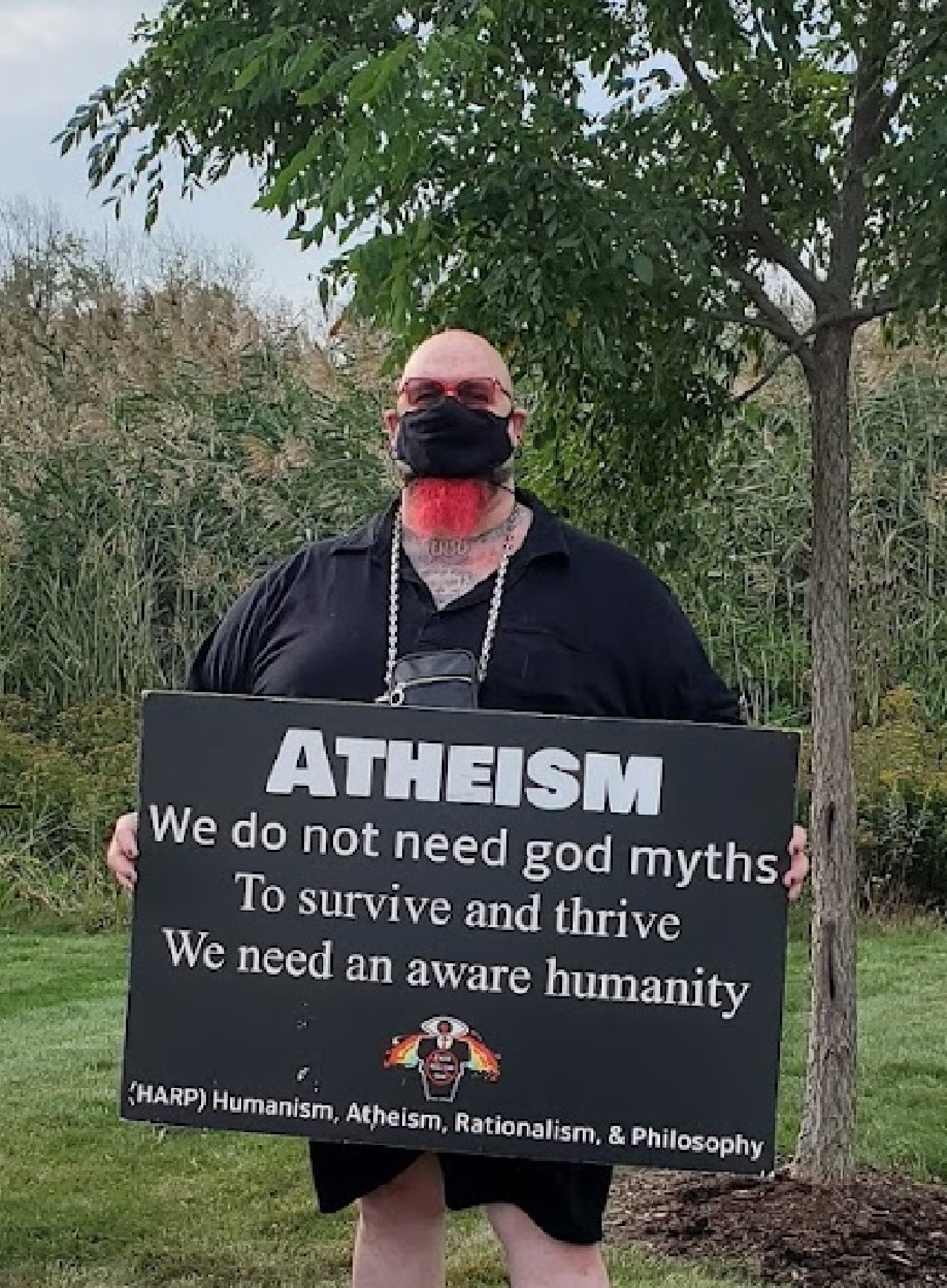

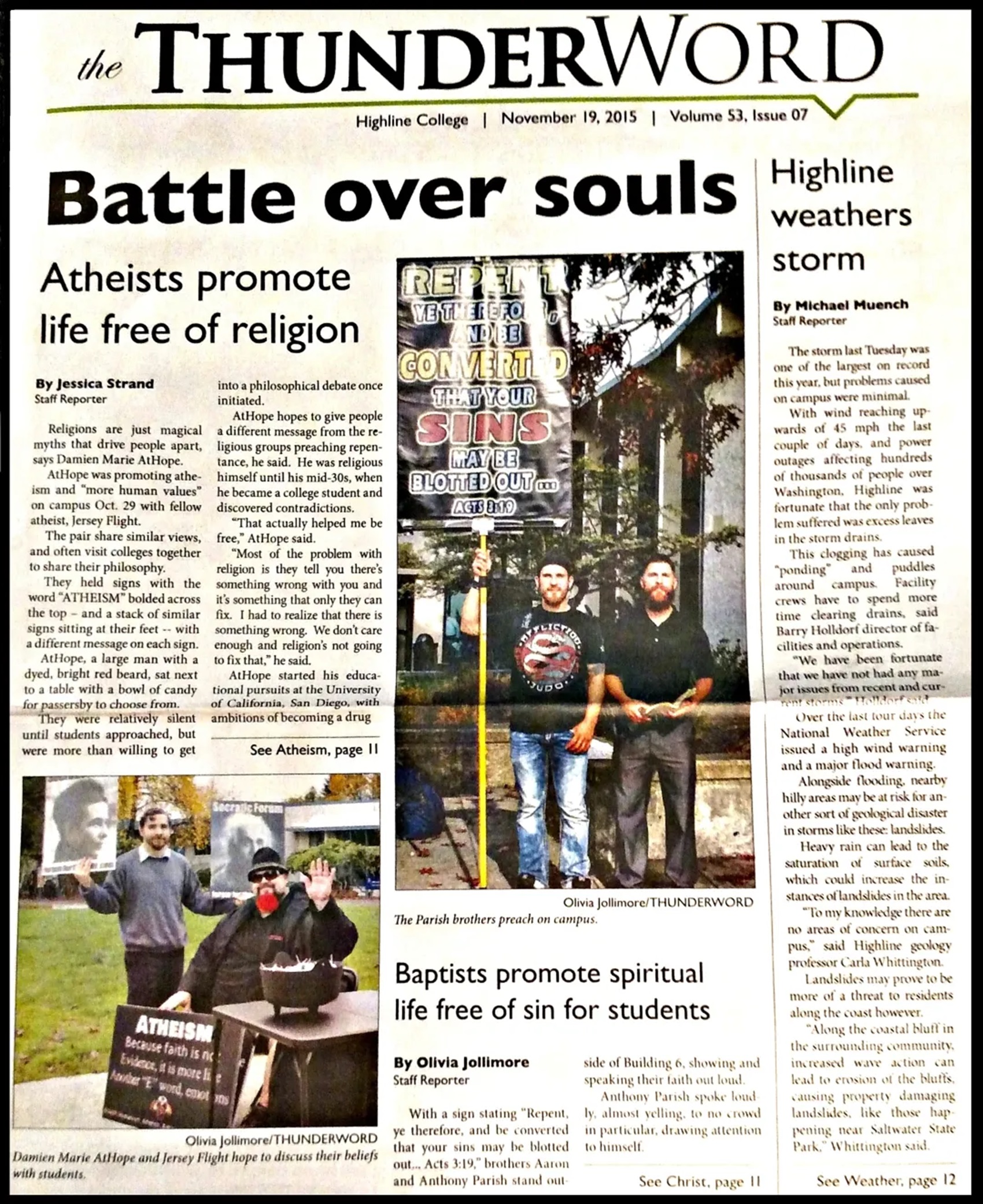

“Theists, there has to be a god, as something can not come from nothing.”
Well, thus something (unknown) happened and then there was something. This does not tell us what the something that may have been involved with something coming from nothing. A supposed first cause, thus something (unknown) happened and then there was something is not an open invitation to claim it as known, neither is it justified to call or label such an unknown as anything, especially an unsubstantiated magical thinking belief born of mythology and religious storytelling.


While hallucinogens are associated with shamanism, it is alcohol that is associated with paganism.
The Atheist-Humanist-Leftist Revolutionaries Shows in the prehistory series:
Show two: Pre-animism 300,000 years old and animism 100,000 years old: related to “Anarchism and Socialism”
Show tree: Totemism 50,000 years old: related to “Anarchism and Socialism”
Show four: Shamanism 30,000 years old: related to “Anarchism and Socialism”
Show five: Paganism 12,000 years old: related to “Anarchism and Socialism”
Show six: Emergence of hierarchy, sexism, slavery, and the new male god dominance: Paganism 7,000-5,000 years old: related to “Anarchism and Socialism” (Capitalism) (World War 0) Elite and their slaves!
Prehistory: related to “Anarchism and Socialism” the division of labor, power, rights, and recourses: VIDEO
Pre-animism 300,000 years old and animism 100,000 years old: related to “Anarchism and Socialism”: VIDEO
Totemism 50,000 years old: related to “Anarchism and Socialism”: VIDEO
Shamanism 30,000 years old: related to “Anarchism and Socialism”: VIDEO
Paganism 12,000 years old: related to “Anarchism and Socialism” (Pre-Capitalism): VIDEO
Paganism 7,000-5,000 years old: related to “Anarchism and Socialism” (Capitalism) (World War 0) Elite and their slaves: VIEDO
Paganism 5,000 years old: progressed organized religion and the state: related to “Anarchism and Socialism” (Kings and the Rise of the State): VIEDO
Paganism 4,000 years old: related to “Anarchism and Socialism” (First Moralistic gods, then the Origin time of Monotheism): VIEDO
I do not hate simply because I challenge and expose myths or lies any more than others being thought of as loving simply because of the protection and hiding from challenge their favored myths or lies.
The truth is best championed in the sunlight of challenge.
An archaeologist once said to me “Damien religion and culture are very different”
My response, So are you saying that was always that way, such as would you say Native Americans’ cultures are separate from their religions? And do you think it always was the way you believe?
I had said that religion was a cultural product. That is still how I see it and there are other archaeologists that think close to me as well. Gods too are the myths of cultures that did not understand science or the world around them, seeing magic/supernatural everywhere.
I personally think there is a goddess and not enough evidence to support a male god at Çatalhöyük but if there was both a male and female god and goddess then I know the kind of gods they were like Proto-Indo-European mythology.
This series idea was addressed in, Anarchist Teaching as Free Public Education or Free Education in the Public: VIDEO
Our 12 video series: Organized Oppression: Mesopotamian State Force and the Politics of power (9,000-4,000 years ago), is adapted from: The Complete and Concise History of the Sumerians and Early Bronze Age Mesopotamia (7000-2000 BC): https://www.youtube.com/watch?v=szFjxmY7jQA by “History with Cy“
Show #1: Mesopotamian State Force and the Politics of Power (Samarra, Halaf, Ubaid)
Show #2: Mesopotamian State Force and the Politics of Power
Show #3: Mesopotamian State Force and the Politics of Power (Uruk and the First Cities)
Show #4: Mesopotamian State Force and the Politics of Power (First Kings)
Show #5: Mesopotamian State Force and the Politics of Power (Early Dynastic Period)
Show #6: Mesopotamian State Force and the Politics of Power
Show #7: Mesopotamian State Force and the Politics of Power (Sargon and Akkadian Rule)
Show #9: Mesopotamian State Force and the Politics of Power (Gudea of Lagash and Utu-hegal)
Show #12: Mesopotamian State Force and the Politics of Power (Aftermath and Legacy of Sumer)

The “Atheist-Humanist-Leftist Revolutionaries”
Cory Johnston ☭ Ⓐ Atheist Leftist @Skepticallefty & I (Damien Marie AtHope) @AthopeMarie (my YouTube & related blog) are working jointly in atheist, antitheist, antireligionist, antifascist, anarchist, socialist, and humanist endeavors in our videos together, generally, every other Saturday.
Why Does Power Bring Responsibility?
Think, how often is it the powerless that start wars, oppress others, or commit genocide? So, I guess the question is to us all, to ask, how can power not carry responsibility in a humanity concept? I know I see the deep ethical responsibility that if there is power their must be a humanistic responsibility of ethical and empathic stewardship of that power. Will I be brave enough to be kind? Will I possess enough courage to be compassionate? Will my valor reach its height of empathy? I as everyone, earns our justified respect by our actions, that are good, ethical, just, protecting, and kind. Do I have enough self-respect to put my love for humanity’s flushing, over being brought down by some of its bad actors? May we all be the ones doing good actions in the world, to help human flourishing.
I create the world I want to live in, striving for flourishing. Which is not a place but a positive potential involvement and promotion; a life of humanist goal precision. To master oneself, also means mastering positive prosocial behaviors needed for human flourishing. I may have lost a god myth as an atheist, but I am happy to tell you, my friend, it is exactly because of that, leaving the mental terrorizer, god belief, that I truly regained my connected ethical as well as kind humanity.
Cory and I will talk about prehistory and theism, addressing the relevance to atheism, anarchism, and socialism.
At the same time as the rise of the male god, 7,000 years ago, there was also the very time there was the rise of violence, war, and clans to kingdoms, then empires, then states. It is all connected back to 7,000 years ago, and it moved across the world.
Cory Johnston: https://damienmarieathope.com/2021/04/cory-johnston-mind-of-a-skeptical-leftist/?v=32aec8db952d
The Mind of a Skeptical Leftist (YouTube)
Cory Johnston: Mind of a Skeptical Leftist @Skepticallefty
The Mind of a Skeptical Leftist By Cory Johnston: “Promoting critical thinking, social justice, and left-wing politics by covering current events and talking to a variety of people. Cory Johnston has been thoughtfully talking to people and attempting to promote critical thinking, social justice, and left-wing politics.” http://anchor.fm/skepticalleft
Cory needs our support. We rise by helping each other.
Cory Johnston ☭ Ⓐ @Skepticallefty Evidence-based atheist leftist (he/him) Producer, host, and co-host of 4 podcasts @skeptarchy @skpoliticspod and @AthopeMarie
Damien Marie AtHope (“At Hope”) Axiological Atheist, Anti-theist, Anti-religionist, Secular Humanist. Rationalist, Writer, Artist, Poet, Philosopher, Advocate, Activist, Psychology, and Armchair Archaeology/Anthropology/Historian.
Damien is interested in: Freedom, Liberty, Justice, Equality, Ethics, Humanism, Science, Atheism, Antiteism, Antireligionism, Ignosticism, Left-Libertarianism, Anarchism, Socialism, Mutualism, Axiology, Metaphysics, LGBTQI, Philosophy, Advocacy, Activism, Mental Health, Psychology, Archaeology, Social Work, Sexual Rights, Marriage Rights, Woman’s Rights, Gender Rights, Child Rights, Secular Rights, Race Equality, Ageism/Disability Equality, Etc. And a far-leftist, “Anarcho-Humanist.”
I am not a good fit in the atheist movement that is mostly pro-capitalist, I am anti-capitalist. Mostly pro-skeptic, I am a rationalist not valuing skepticism. Mostly pro-agnostic, I am anti-agnostic. Mostly limited to anti-Abrahamic religions, I am an anti-religionist.
To me, the “male god” seems to have either emerged or become prominent around 7,000 years ago, whereas the now favored monotheism “male god” is more like 4,000 years ago or so. To me, the “female goddess” seems to have either emerged or become prominent around 11,000-10,000 years ago or so, losing the majority of its once prominence around 2,000 years ago due largely to the now favored monotheism “male god” that grow in prominence after 4,000 years ago or so.
My Thought on the Evolution of Gods?
Animal protector deities from old totems/spirit animal beliefs come first to me, 13,000/12,000 years ago, then women as deities 11,000/10,000 years ago, then male gods around 7,000/8,000 years ago. Moralistic gods around 5,000/4,000 years ago, and monotheistic gods around 4,000/3,000 years ago.
To me, animal gods were likely first related to totemism animals around 13,000 to 12,000 years ago or older. Female as goddesses was next to me, 11,000 to 10,000 years ago or so with the emergence of agriculture. Then male gods come about 8,000 to 7,000 years ago with clan wars. Many monotheism-themed religions started in henotheism, emerging out of polytheism/paganism.

Damien Marie AtHope (Said as “At” “Hope”)/(Autodidact Polymath but not good at math):
Axiological Atheist, Anti-theist, Anti-religionist, Secular Humanist, Rationalist, Writer, Artist, Jeweler, Poet, “autodidact” Philosopher, schooled in Psychology, and “autodidact” Armchair Archaeology/Anthropology/Pre-Historian (Knowledgeable in the range of: 1 million to 5,000/4,000 years ago). I am an anarchist socialist politically. Reasons for or Types of Atheism
My Website, My Blog, & Short-writing or Quotes, My YouTube, Twitter: @AthopeMarie, and My Email: damien.marie.athope@gmail.com

